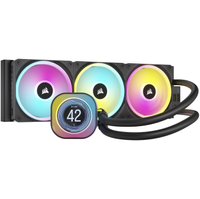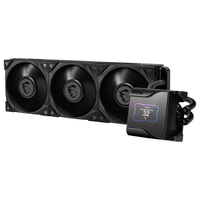Best liquid cooler for CPUs in 2025: I've tried all the best AIO coolers and these are my top picks
These are the best liquid chip chillers to suit all budgets, form factors, and processors.
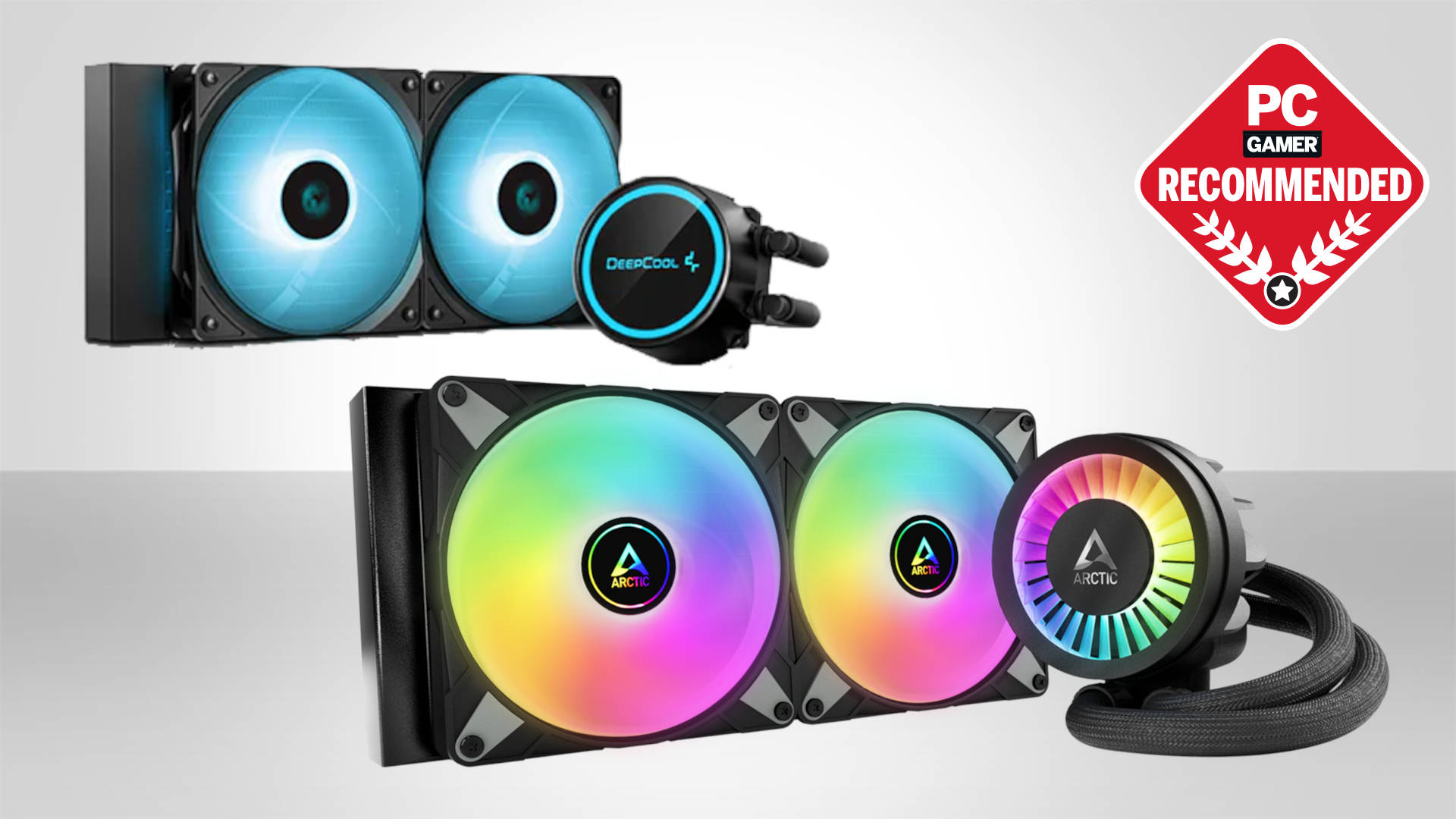
The best cooler for your PC could well be an all-in-one (AIO) unit. Offering many of the benefits of liquid cooling, which can be more capable than air, an AIO cooler is easy to set up and provide an ideal balance of performance, convenience, and price. And they generally don't leak, either, before you ask.
We've tested and personally used many different models, but the best liquid cooler right now is the Arctic Liquid Freezer III. It comes in four different sizes, and there are two options for colors and RGB lighting. The cooling performance is superb and it's great value for money. If you're looking to spend as little as possible, then the Deepcool Gammaxx L-series V2 is the best budget liquid cooler in our opinion.
But if liquid coolers aren't right for you, then check out the full best CPU coolers list to see else might be more up your street.

Nick's been slapping coolers on CPUs since the early 1990s, when he tried to overclock an Intel 486 and found that it got a tad on the toasty side. Since then, he's tested, and broke, countless different models of air and closed-loop (AIO) coolers, so he knows exactly what's hot and what's not.
The quick list
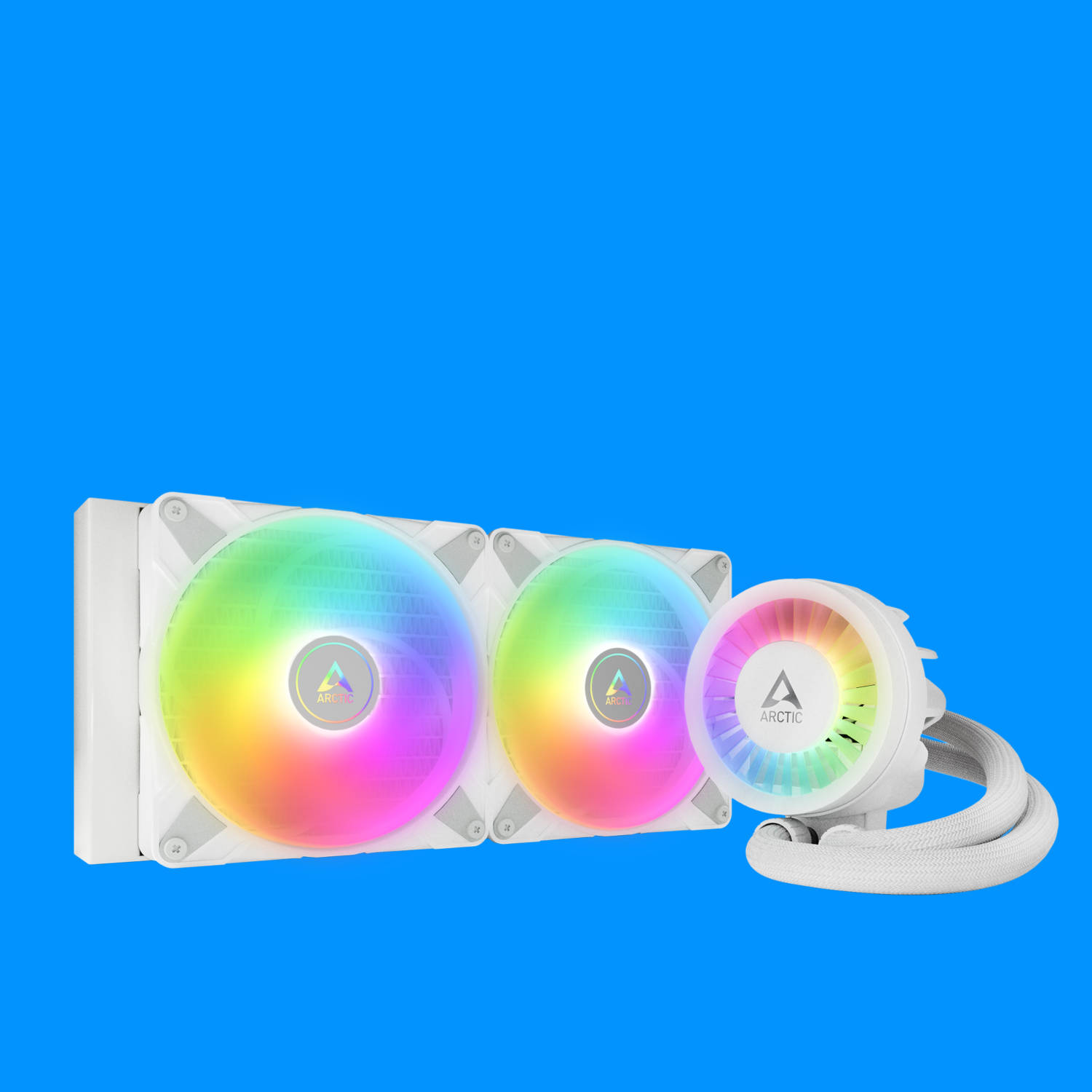
The best overall
Arctic's successor to the popular Freezer II is more than a simple update. It's by far the best overall AIO cooler you can buy right now, though it can be quite fiddly to install.
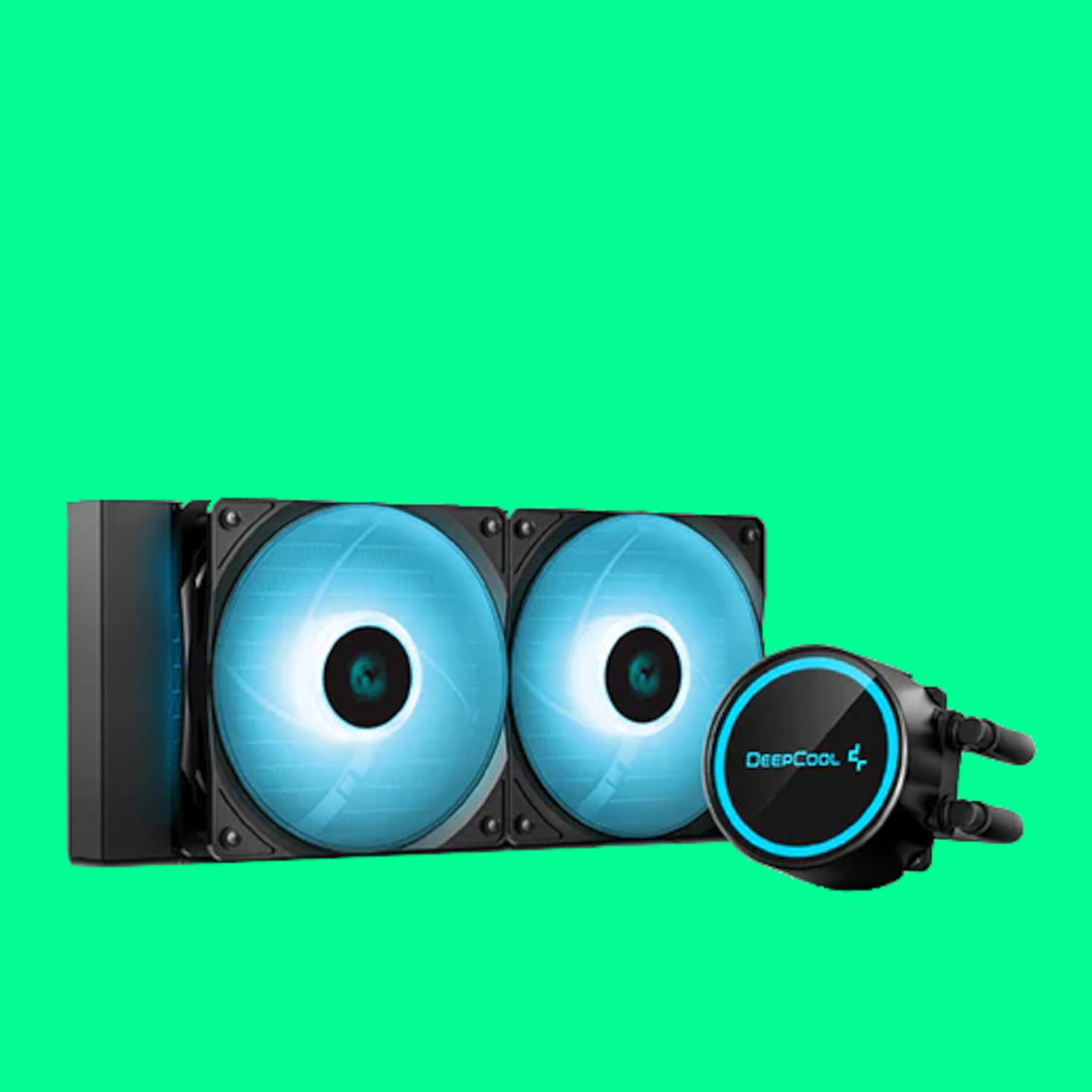
The best budget
There are cheaper coolers and there are better coolers, but the Deepcool Gammaxx L-series hits the right balance between performance and price tag.
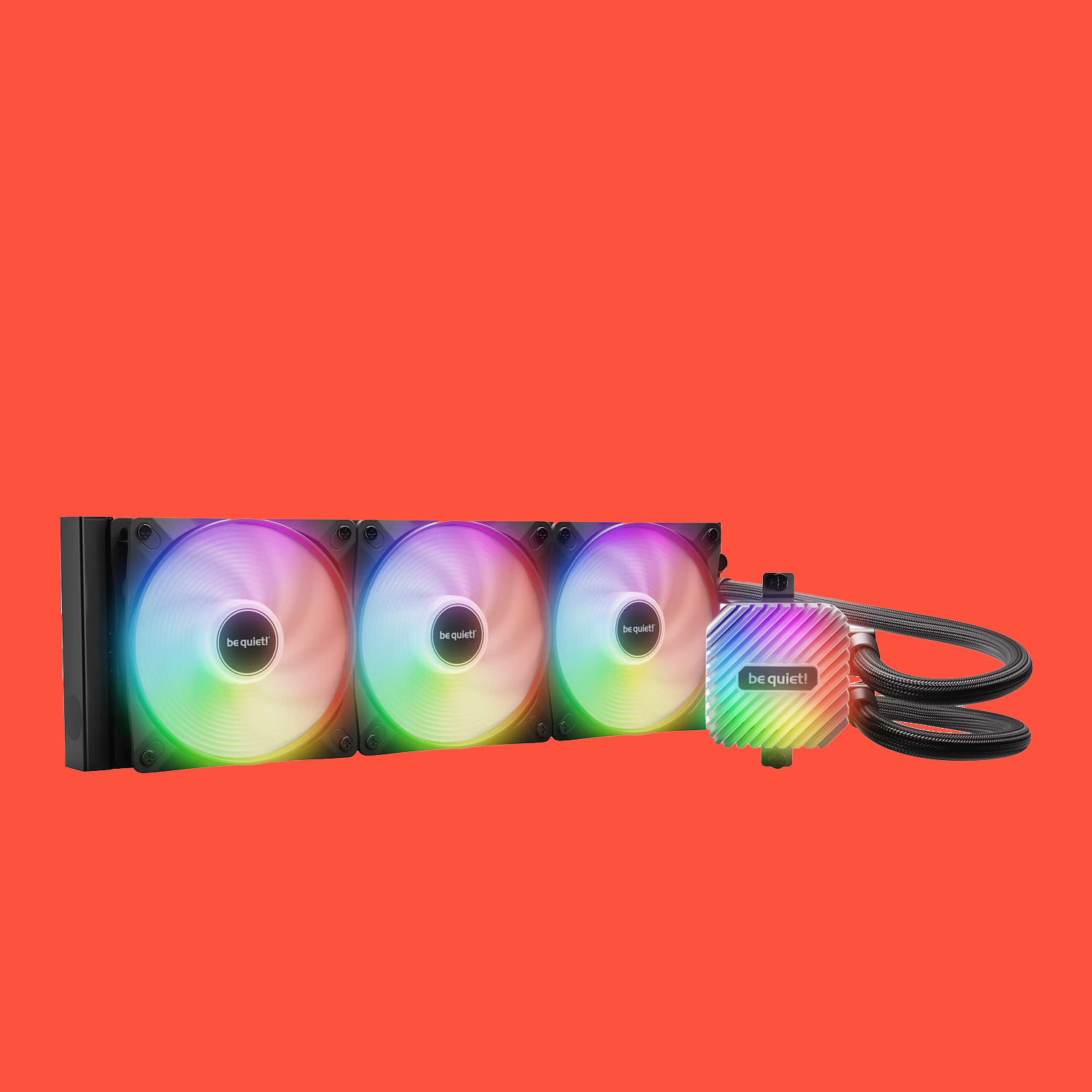
The best high-end
The Be Quiet! Light Loop is exceptional for the money. You could spend more than this and still not get the performance it delivers.
⬇️ Click to load more of the best liquid coolers ⬇️

The best looking
It's Thicc not only in name but also in stature. It also comes with what is, essentially, an Android computer attached to the front of it with a chunky screen. It's hit-or-miss in appeal, but in the right build, it looks amazing.
Recent updates
This page was updated on February 25, 2025 to ensure all our recommendations still represent the best AIO coolers on the market right now (they do!) and add some extra context to our FAQ.
The best liquid cooler
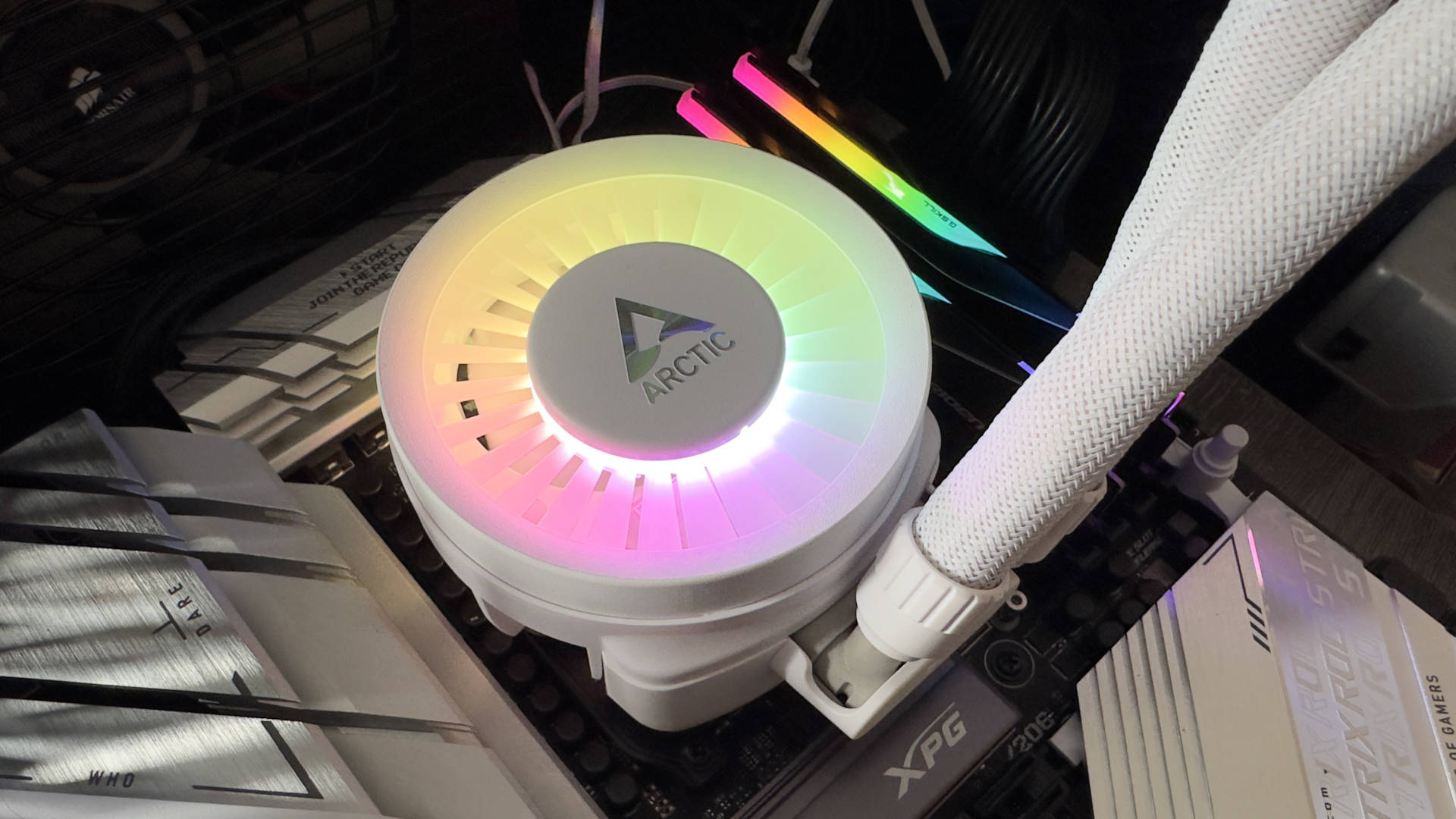
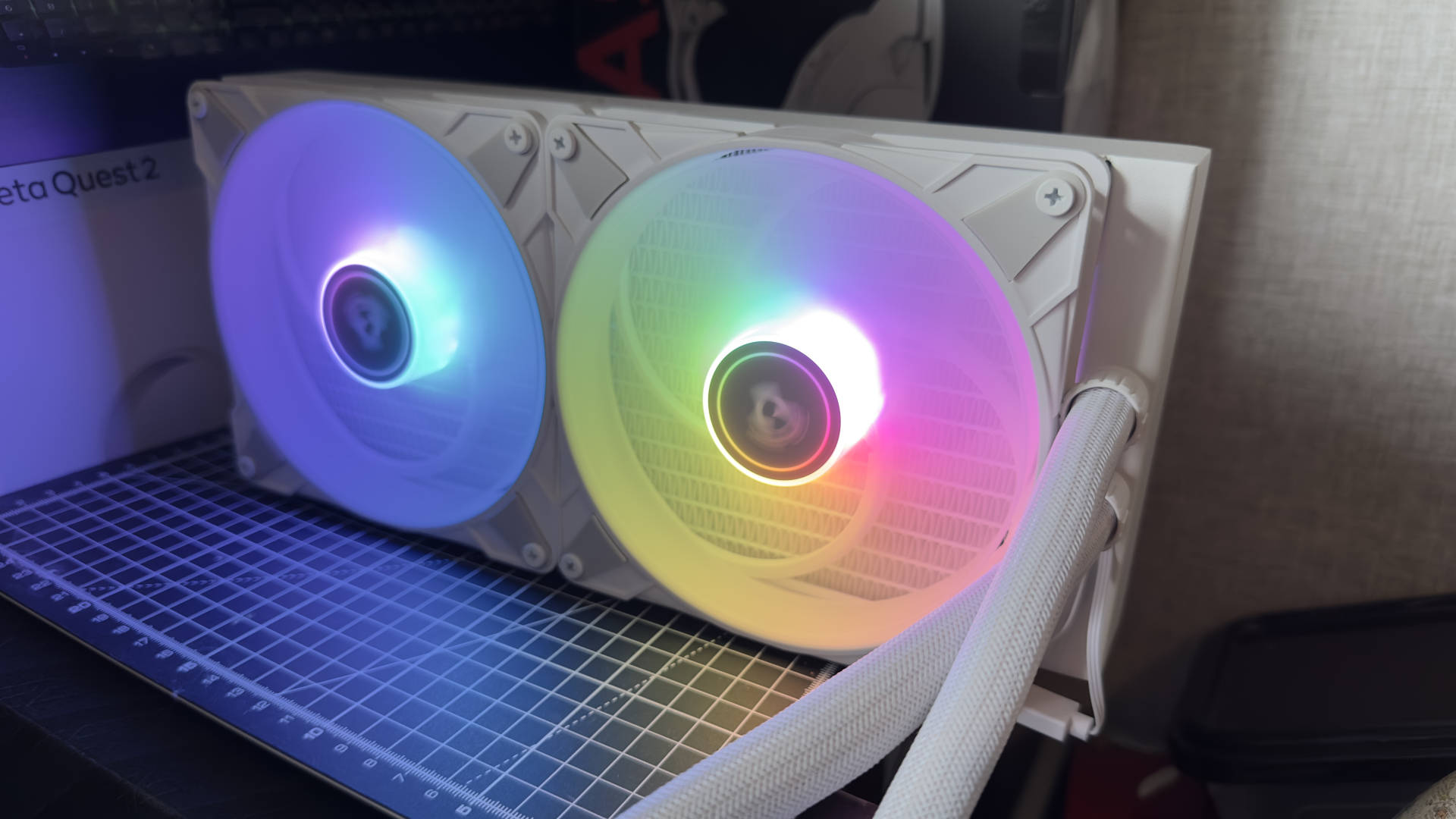
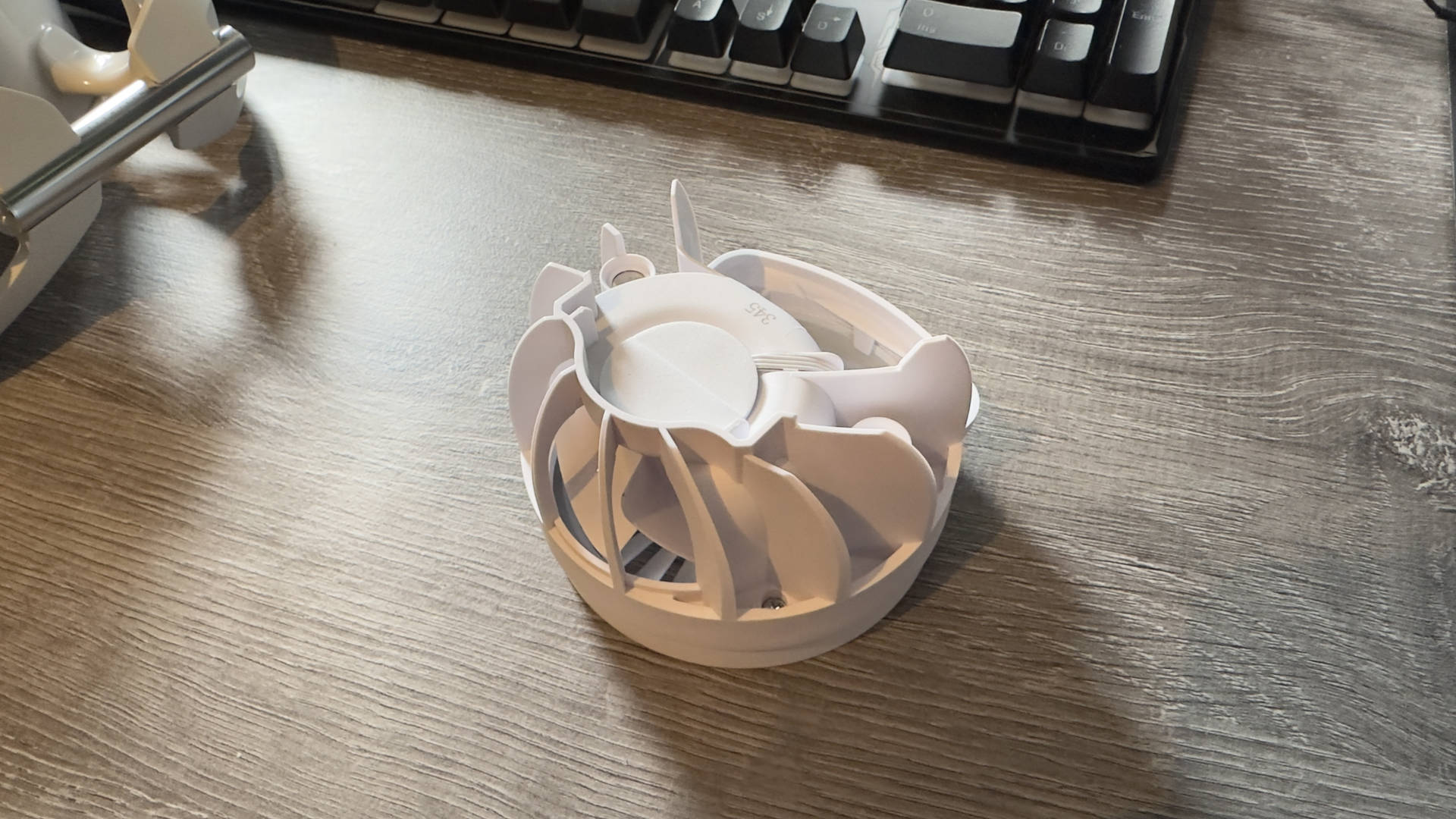
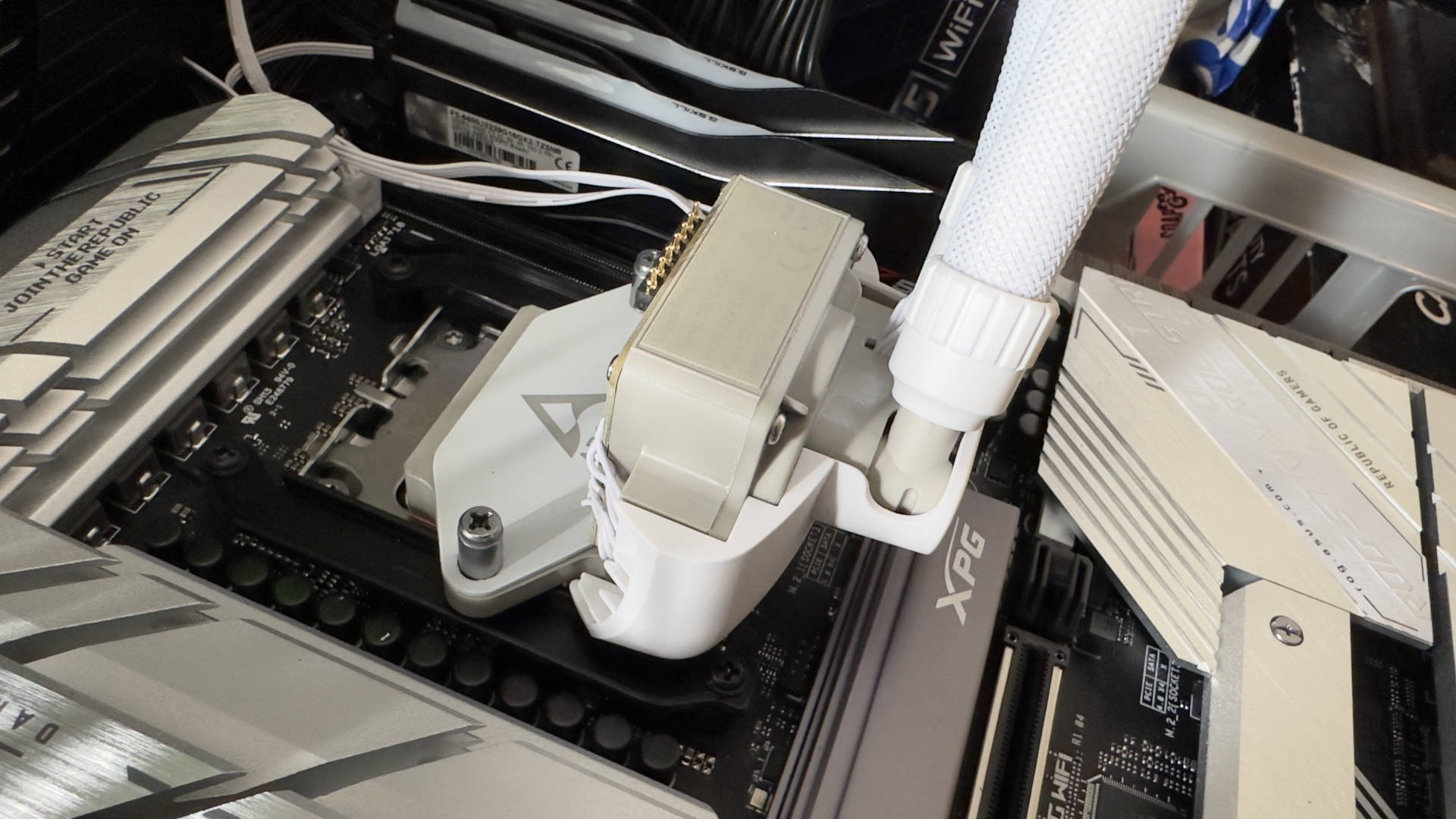
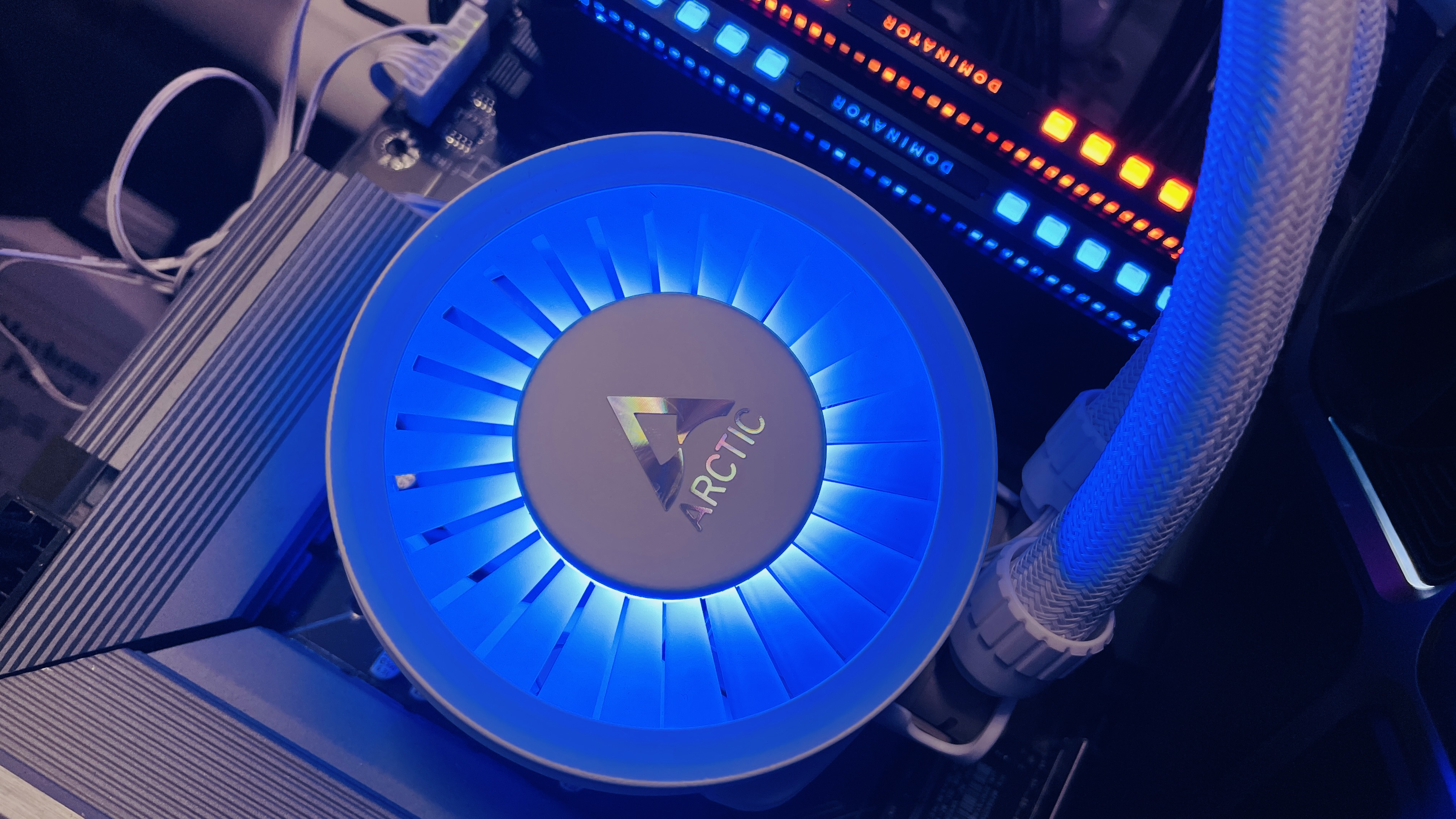
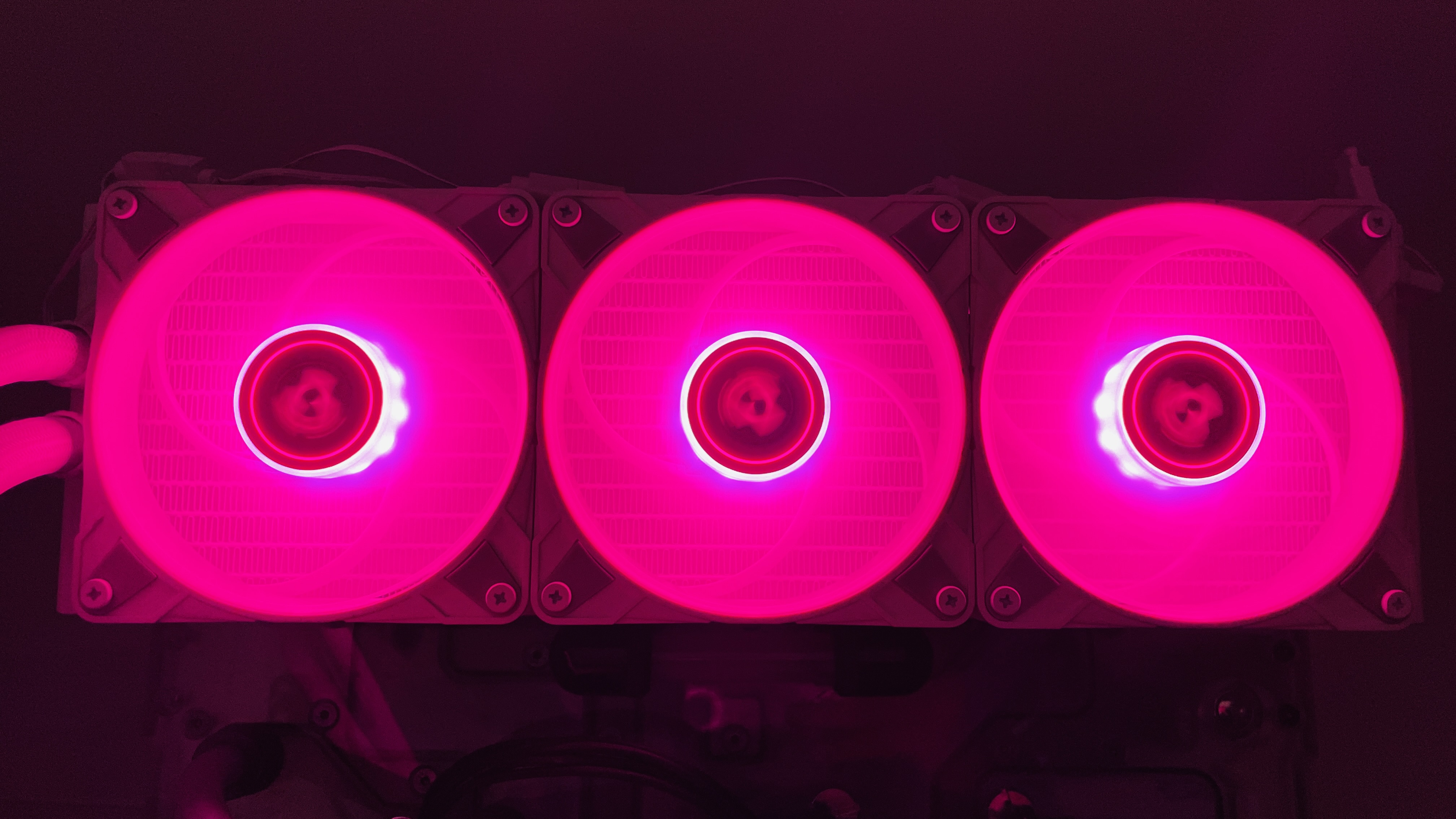
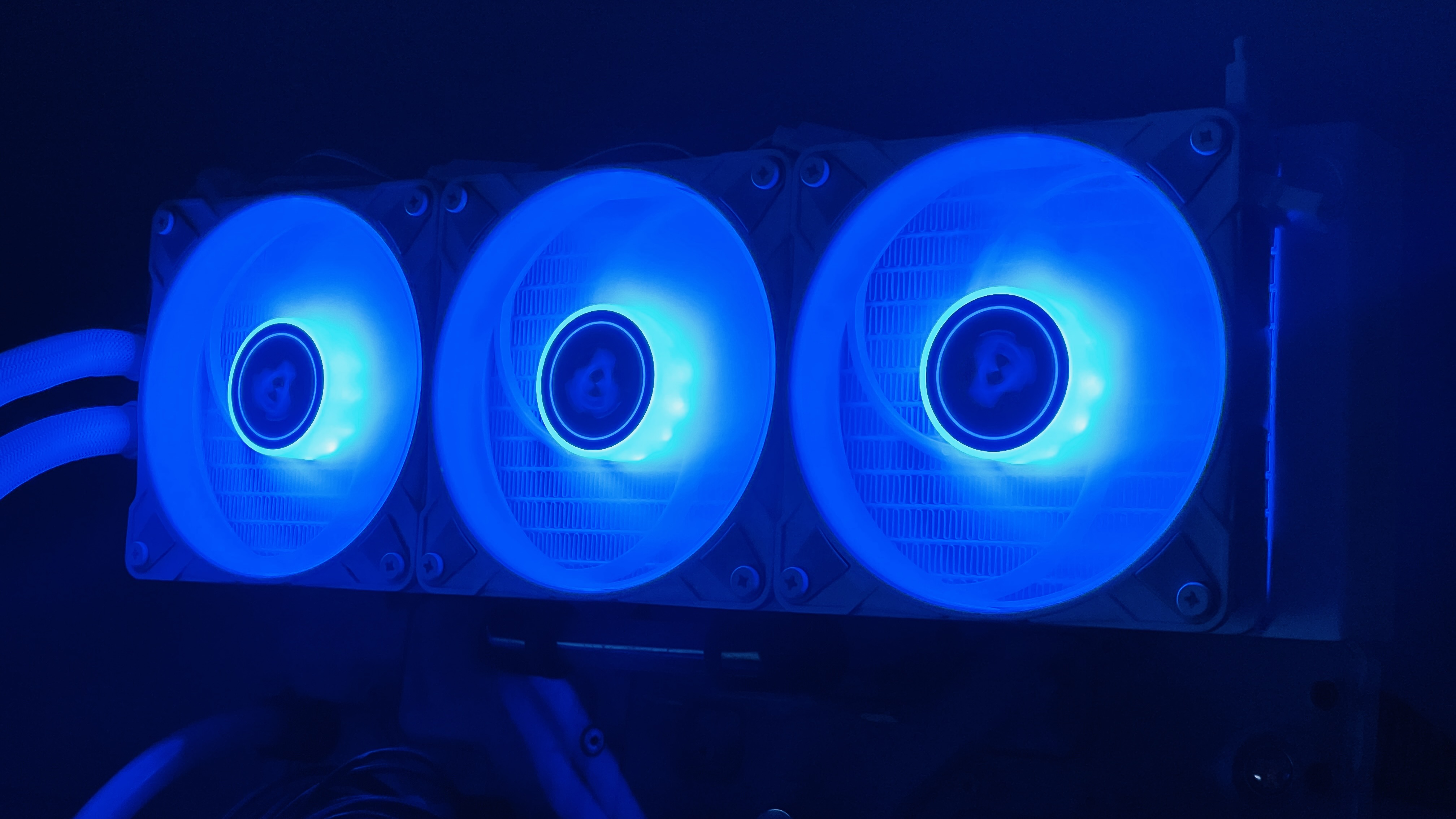
Specifications
Reasons to buy
Reasons to avoid
✅ If you need serious cooling: The chunky radiator and quality fans deliver outstanding cooling performance.
✅ If you want to keep the VRMs cool too: The fan in the CPU block might look like a gimmick, but it moves a decent amount of over the motherboard VRMs.
❌ If you have a compact case: The extra thick radiator means it won't fit properly in lots of cases, and that goes double for the really massive versions.
❌ If you want flashy looks: Despite having addressable RGB lighting, there's no software to control them and the main pump looks a bit cheap.
The best liquid cooler is the Arctic Liquid Freezer III. Its predecessor, the Liquid Freezer II, was (and still is) very popular, thanks to its low price and superb cooling performance. It wasn't the flashiest of coolers, but it did come with a tiny fan in the main pump to help cool the motherboard's VRMs (voltage regulation modules). The Freezer III has retained all these elements and substantially improved on them.
Available in four sizes of radiator (240, 280, 360, and 420 mm), two color options, with or without RGB lighting, the Liquid Freezer III covers just about all possible use scenarios, with some important exceptions. The first of which happens to be Intel CPU socket support. Where the Freezer II will fit on just about any Intel processor, the Freezer III only works on those using the LGA1700 socket (12th Gen or newer).
That's because the cooler uses a proprietary mounting system that requires you to remove the default ILM (independent loading mechanism)—the new bracket ensures the pump block sits firmly on the CPU's heat spreader for optimal cooling.
The Liquid Freezer III is a bit of a hassle to get fitted with AMD's latest processors. But if you're not planning to change your CPU at all, it's a one-and-done sorta deal.
Once it's fitted, you'll be treated to outstanding cooling, all relatively quietly thanks to the use of Arctic's P14 140 mm fans in the 280/420 models. Or P12 120 mm fans in the 240/360 models.
Even at full speed, the noise levels are acceptable, as the pitch of the sound is quite low. That's even with the additional VRM fan system, which is much larger than that in the Freezer II. It shifts a decent amount of air around it, which is great for keeping those vital motherboard components cool.
And thanks to an extra deep radiator, the Freezer's cooling performance is superb, with the 280 mm version easily better most of the competition, even larger ones. The additional heft and unique mounting system does make it very fiddly to install in some PCs, especially if there isn't much room between the top of the motherboard and the case.
The 360 mm version also performs incredibly well, dealing with a Core i7 14700K in our test rig without any issue, even under more intense loads than just gaming.
The addressable RGBs require you to adjust them yourself, either via the motherboard's UEFI or a third-party application, as Arctic doesn't offer any software package. On the plus side, the fans come pre-installed in a push configuration, for top PC case mounting.
Alongside the fantastic cooling performance, the other great aspect of the Liquid Freezer III is its price. It's frequently discounted but even at full price is incredibly competitive.
There's nothing else as good as the Freezer III for the money.
Read our full Artic Liquid Freezer III 360 A-RGB review.
The best budget liquid cooler
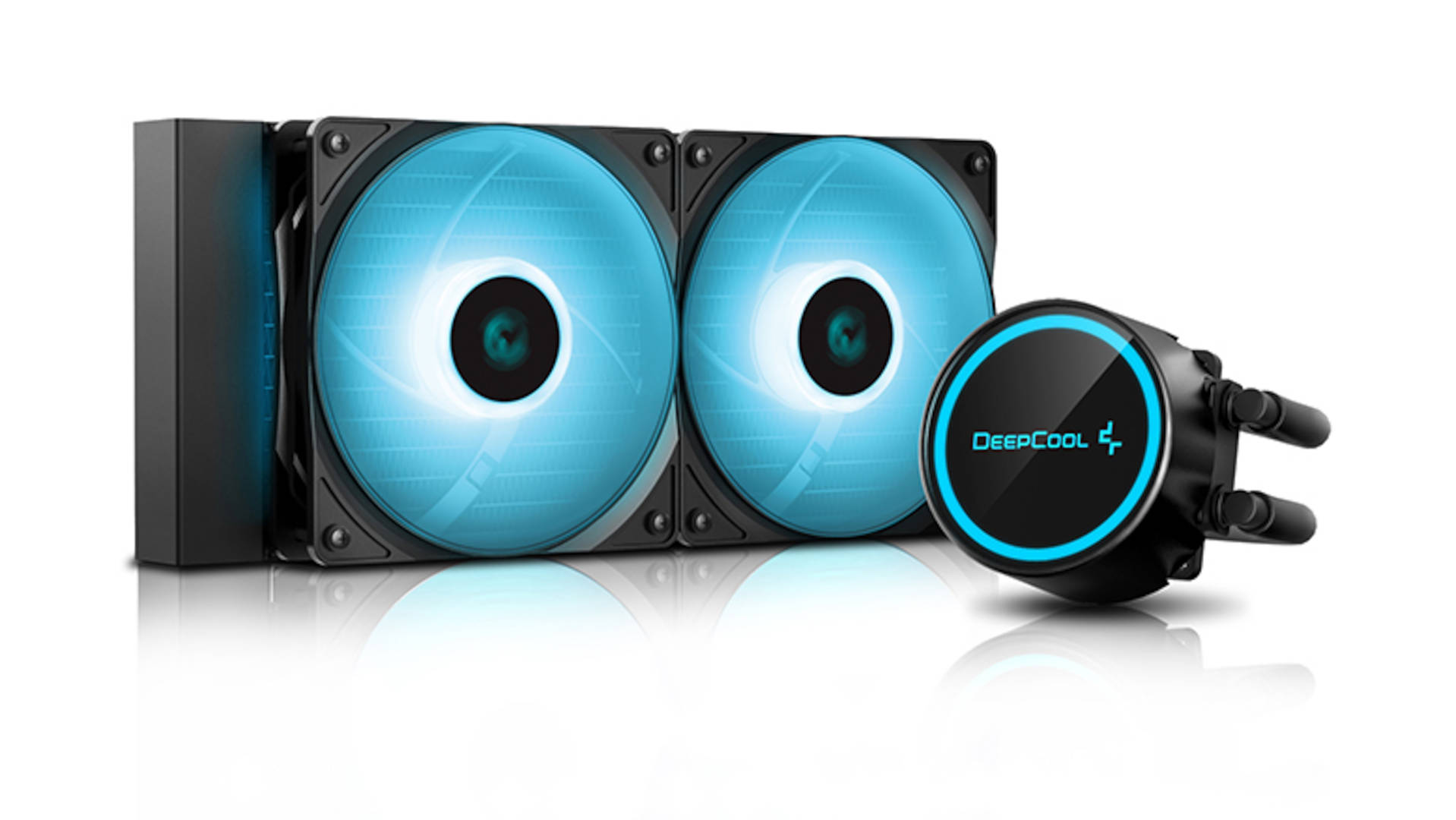
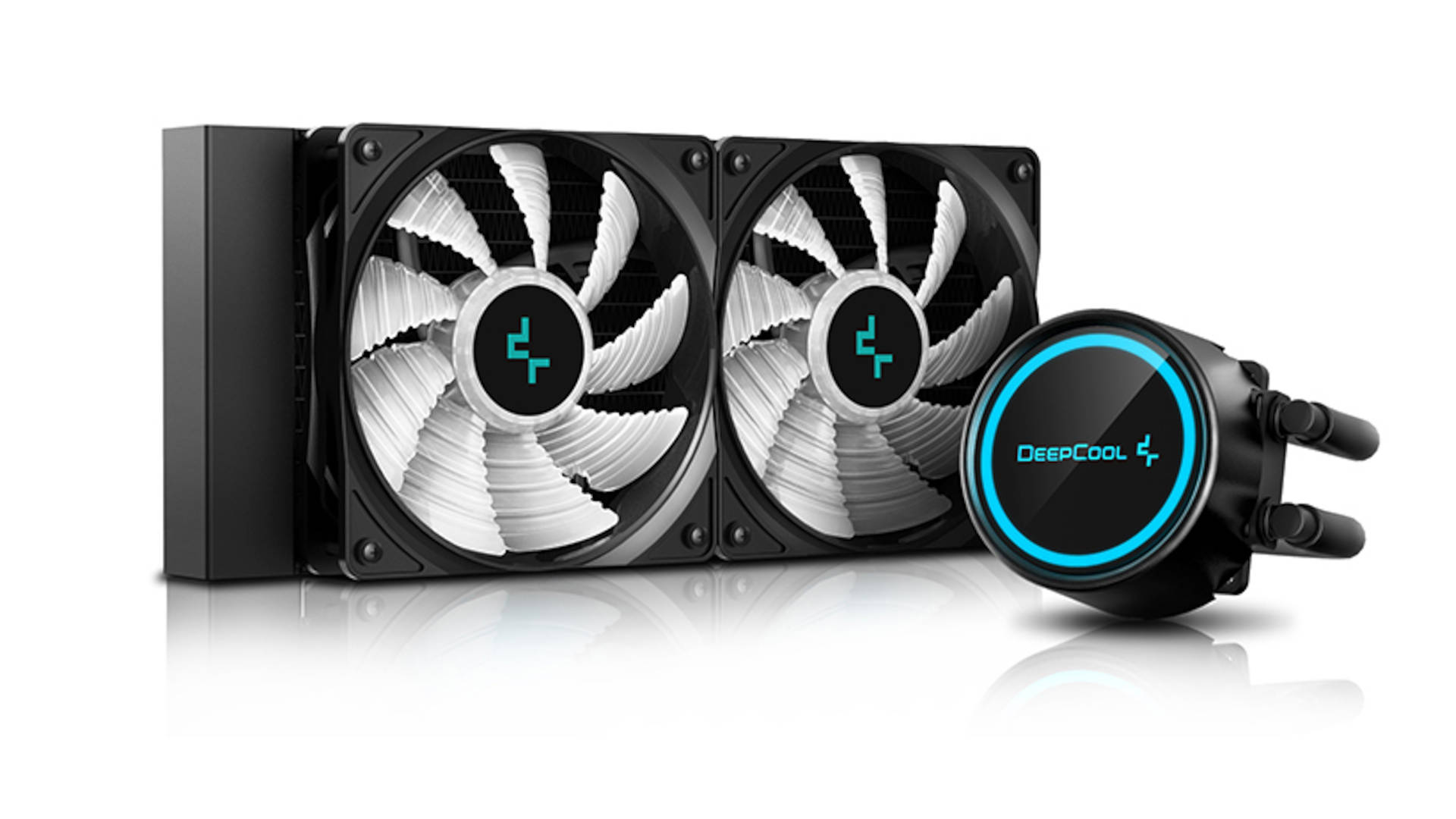
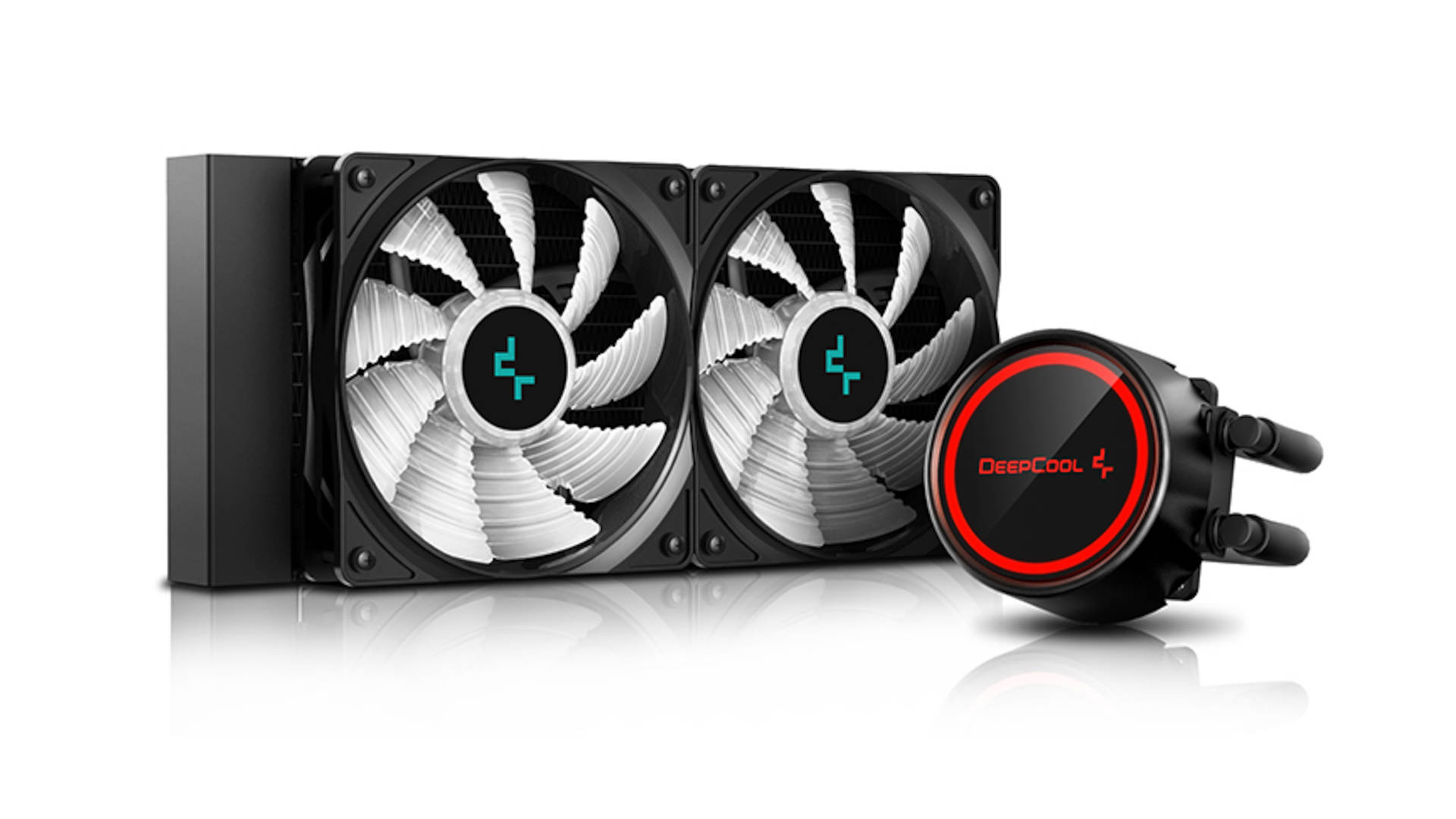
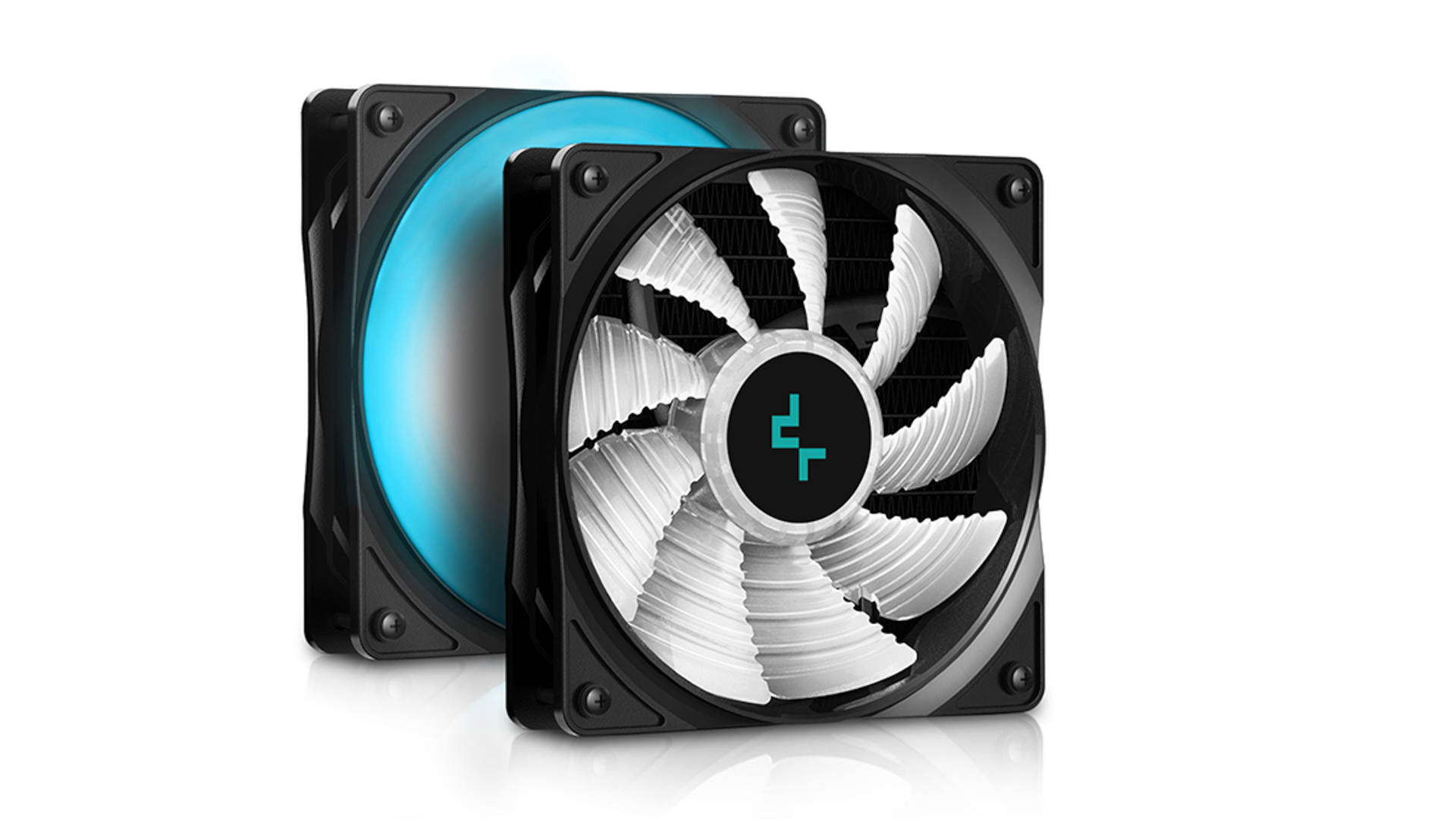
2. Deepcool Gammaxx L-series V2
Our expert review:
Specifications
Reasons to buy
Reasons to avoid
✅ If you want great value for money: Even though you can buy cheaper coolers, few will touch the Deepcool for it's balance of heat shifting speed and price tag.
✅ If you want a quiet PC: When idle or under a light load, the fans and pump are barely audible. Perfect if you hate noise.
❌ If your PC regularly works hard: If you have a high power CPU and it's used at full load a lot of the time, the fans have to spin extra fast to cope and they're not very quiet at full speed.
❌ If you want more bling: Sure there's plenty of RGB, but beyond that the cooler looks rather cheap. Because it is.
The best budget liquid cooler is the Deepcool Gammaxx L-series V2. Well known for making capable coolers with presentable price tags, this model by Deepcool fits the bill perfectly, specifically the 240 mm model. This being one of the cheaper 240 mm coolers on the market.
You get the usual level of features, such as basic RGB lighting in the pump head and fans. If you want addressable LEDs then there’s a more expensive version with this feature, should you really want it.
The ‘anti-leak technology’ is heavily promoted by Deepcool, the idea of which being to maintain optimal water pressure, inside the loop, for the lifespan of the cooler. If you're new to AIOs and worried about leaks, then this feature may well appeal.
Despite the low price, the Gammaxx L240 is capable of cooling most processors, though Intel's 14th Gen i9 chips are too much for the little cooler when drawing full power. Pretty much everything else will be fine, running with remarkably low noise levels, which is one of the main reasons we recommend it.
At idle the L240 is effectively silent but as you’d expect, you will start to see an increase in temperatures and noise levels with high TDP processors, especially when overclocking. Under heavy loads, the fans ramp up quite a bit, unless you configure them not to, but then they it won't cool so well.
If you’re after a 240 mm AIO that’s inexpensive and quiet under less demanding loads, then the Deepcool Gammaxx L240 is a great choice. Its noise levels can get high if you push it too hard, but at this price it comes highly recommended.
The best high-end liquid cooler
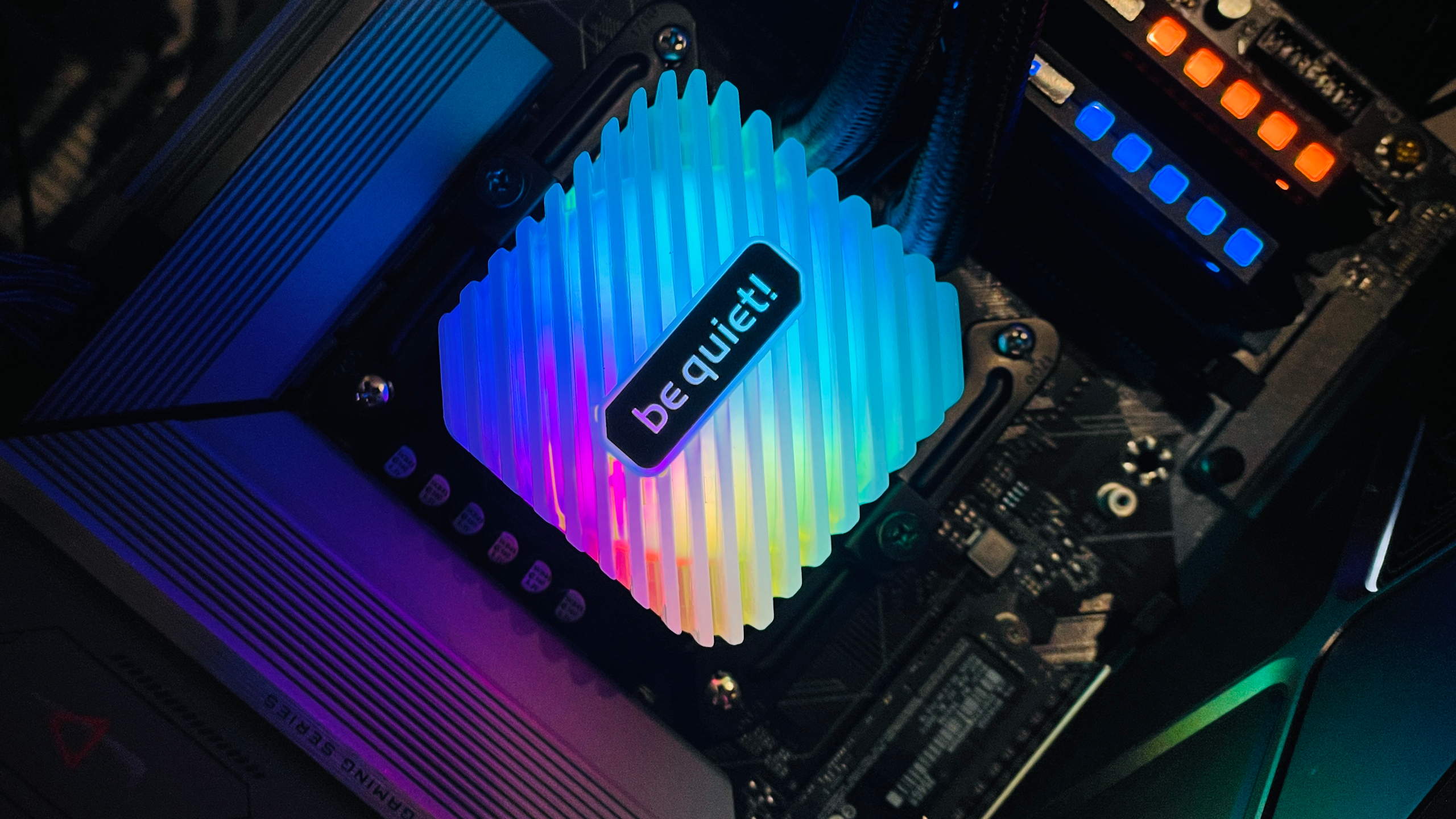
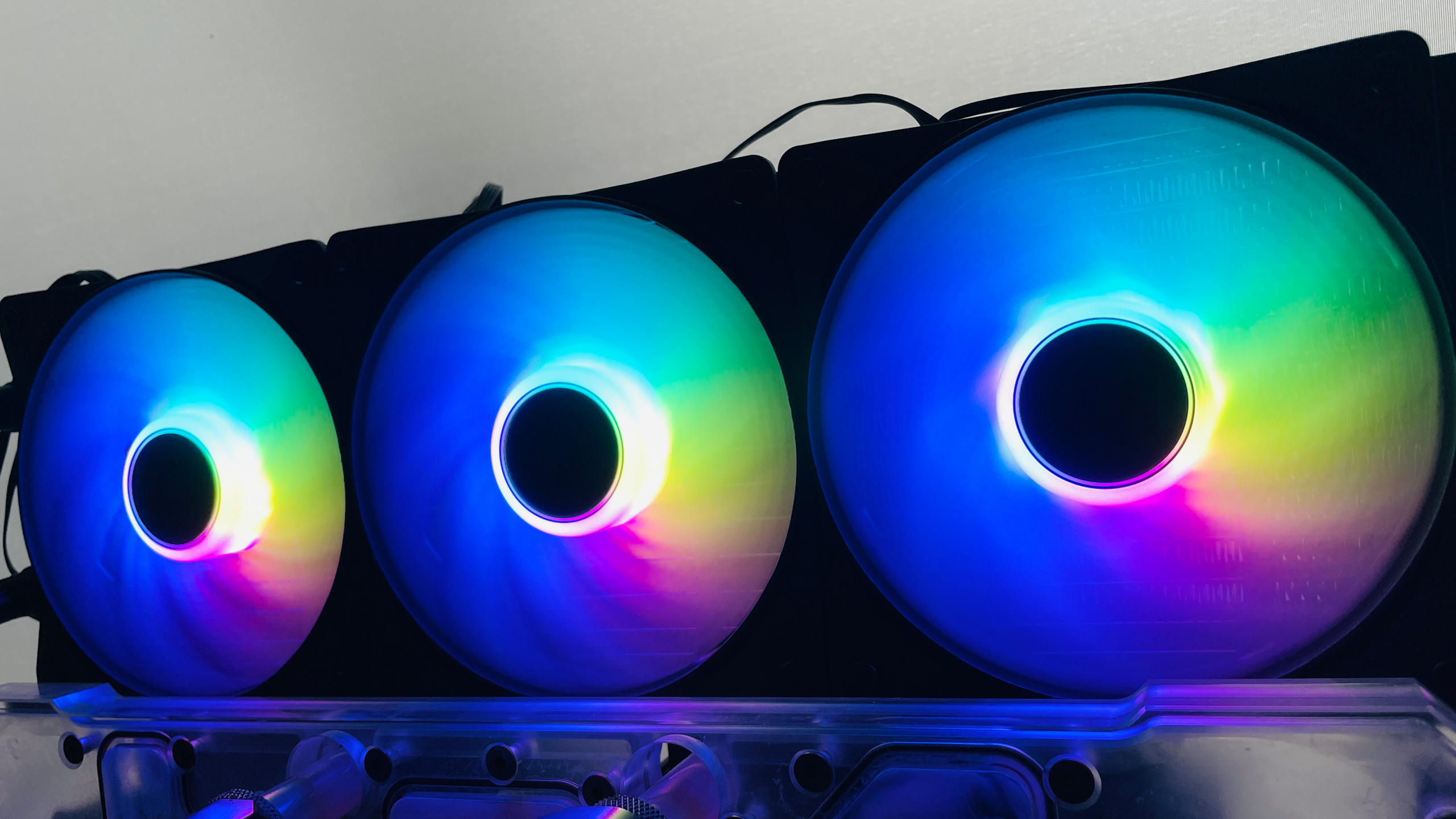
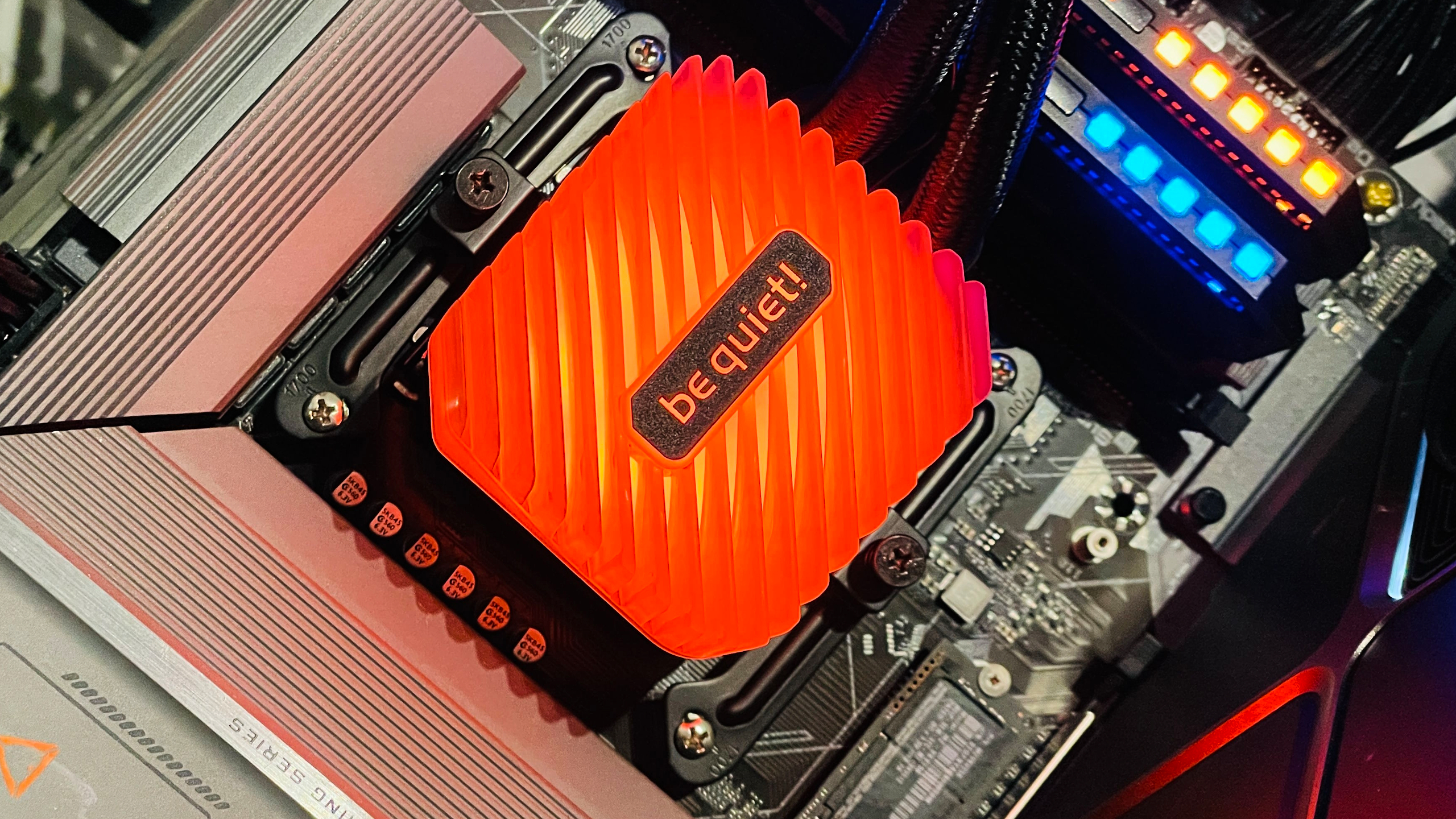
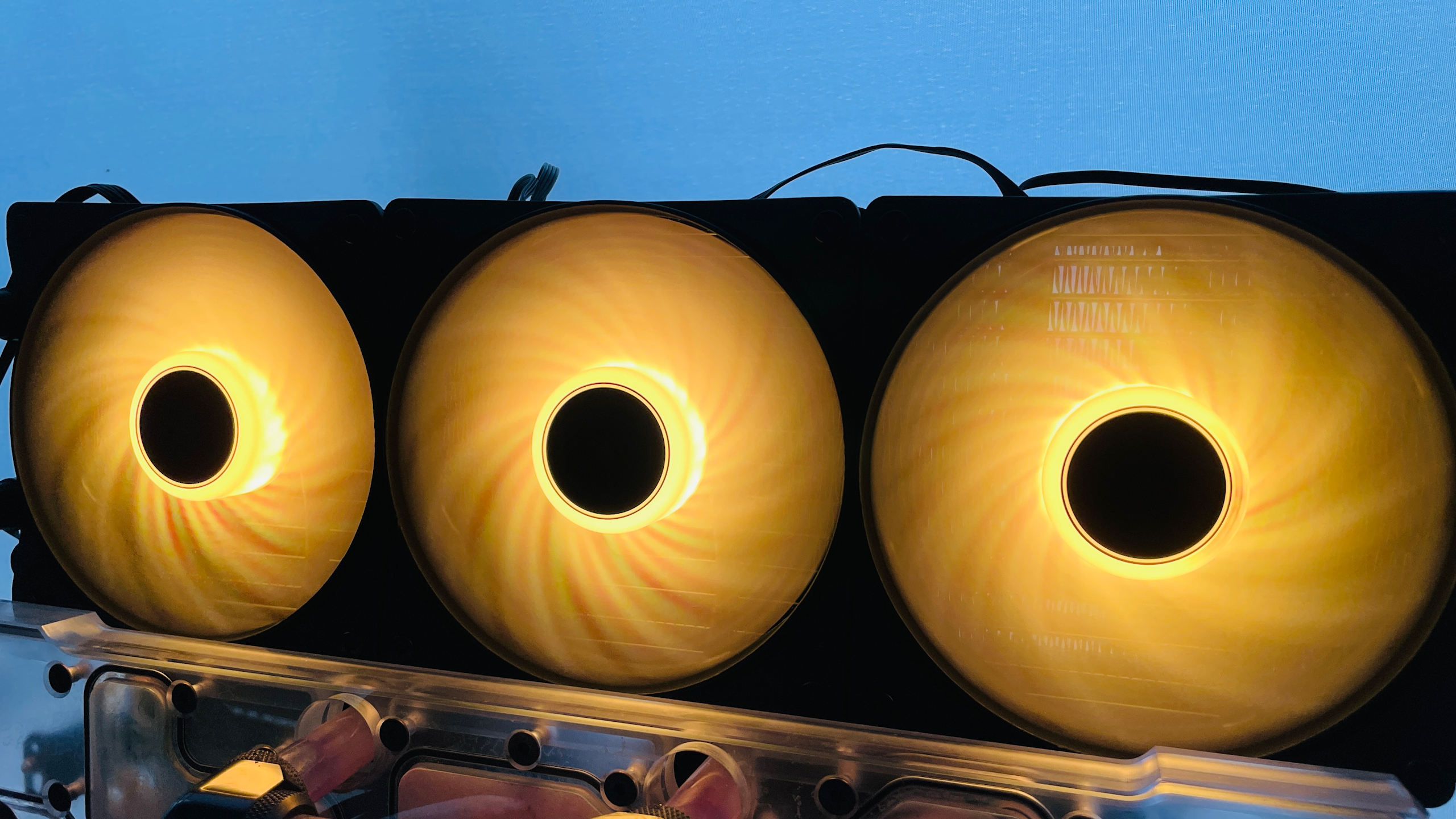
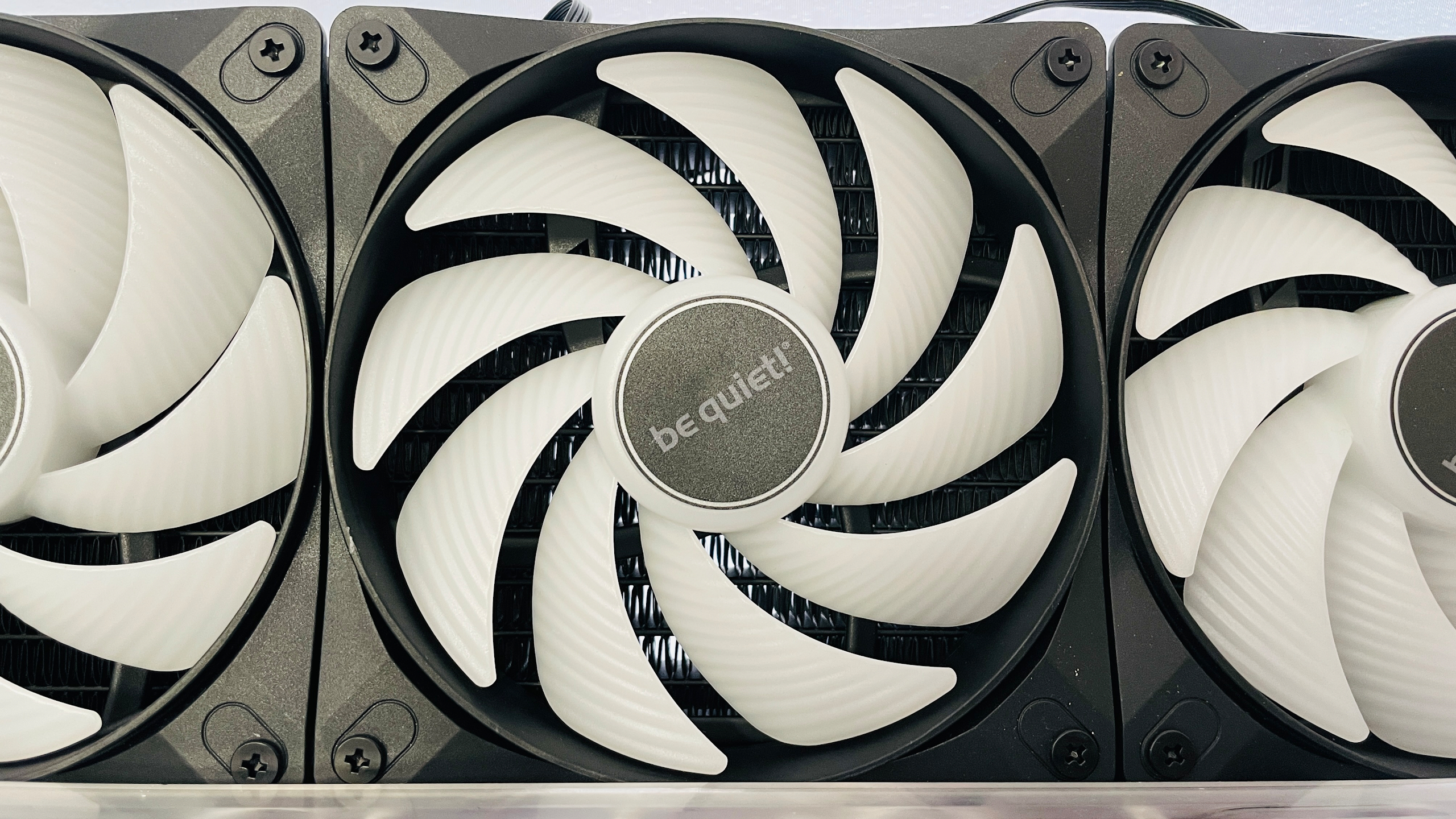
Specifications
Reasons to buy
Reasons to avoid
✅ You want a very quiet pump: The pump on the Light Loop is extremely low noise in operation, which makes a change from many AIO coolers.
✅ You want longevity: This pump comes with refillable coolant, which means it should last longer than most. Though if you aren't planning to keep it for ten years, this might be wasted on you.
❌ You want the simplest installation: While relatively straightforward, there are a large number of components to fit with this design.
The best high-end liquid cooler on the market today is the Be Quiet! Light Loop. It comes in 240/360 mm sizes, and it's the top 360 mm version that we've come to appreciate the most from our testing with it.
The first thing to note about the Light Loop is that it's refillable. That's a bit of a rarity with AIO loops. Over time, liquid evaporates out of even a completely sealed loop. As more liquid leaves the loop, more air creeps in. This increases noise, and eventually will leave the loop less capable at cooling. The benefit of a refillable loop such as this is that you can top it up every so often and keep it going cool and quiet for longer.
Though don't be fooled, this is a capable cooler that needn't topping up anytime soon out of the box. It only comes with a regular thickness radiator at 27 mm deep, but it manages to deal with excessive heat extremely well.
Even with the 14700K, which is a pretty hot chip, this cooler managed to stay frosty at sub 80°C in Cinebench R23's 10-minute run. That's 3°C lower than the Arctic under the same conditions.
This is a solid pick for AMD processors, too. The mounting is pretty straightforward even while involving a fair few parts, but it importantly allows for off-center mounting for AM5 chips. That can help AMD's processors stay a little cooler all round.
The Be Quiet is what I'd call 'industrial' in its appearance. In some ways, that's a good thing. The CPU pump head has RGB lighting beneath it to create a diffused look that's both eye-catching and smart-looking. The fans are also emblazoned with RGB LEDs, for the complete look. However, it doesn't hide its cables particularly well, and even with the included fan and hub, it requires careful cable routing to look half-decent.
As for noise levels, we had no complaints here. Its pump is only audible at full speed once you turn down any other case fans in your system. Though the case fans do whirr up to an audible level at max speed. It has enough of a performance overhead to allow for tuning it back to run at slower speeds without much hit to thermals, however, if you're particularly sensitive to noise.
Altogether, this is a mighty tool for a gaming PC. It has the performance, looks and longevity all covered. Also, despite being our top high-end pick, it doesn't cost a fortune. It's just more money than super-affordable options, like the Liquid Freezer III.
Read our full Be Quiet! Light Loop 360mm review.
The best looking liquid cooler
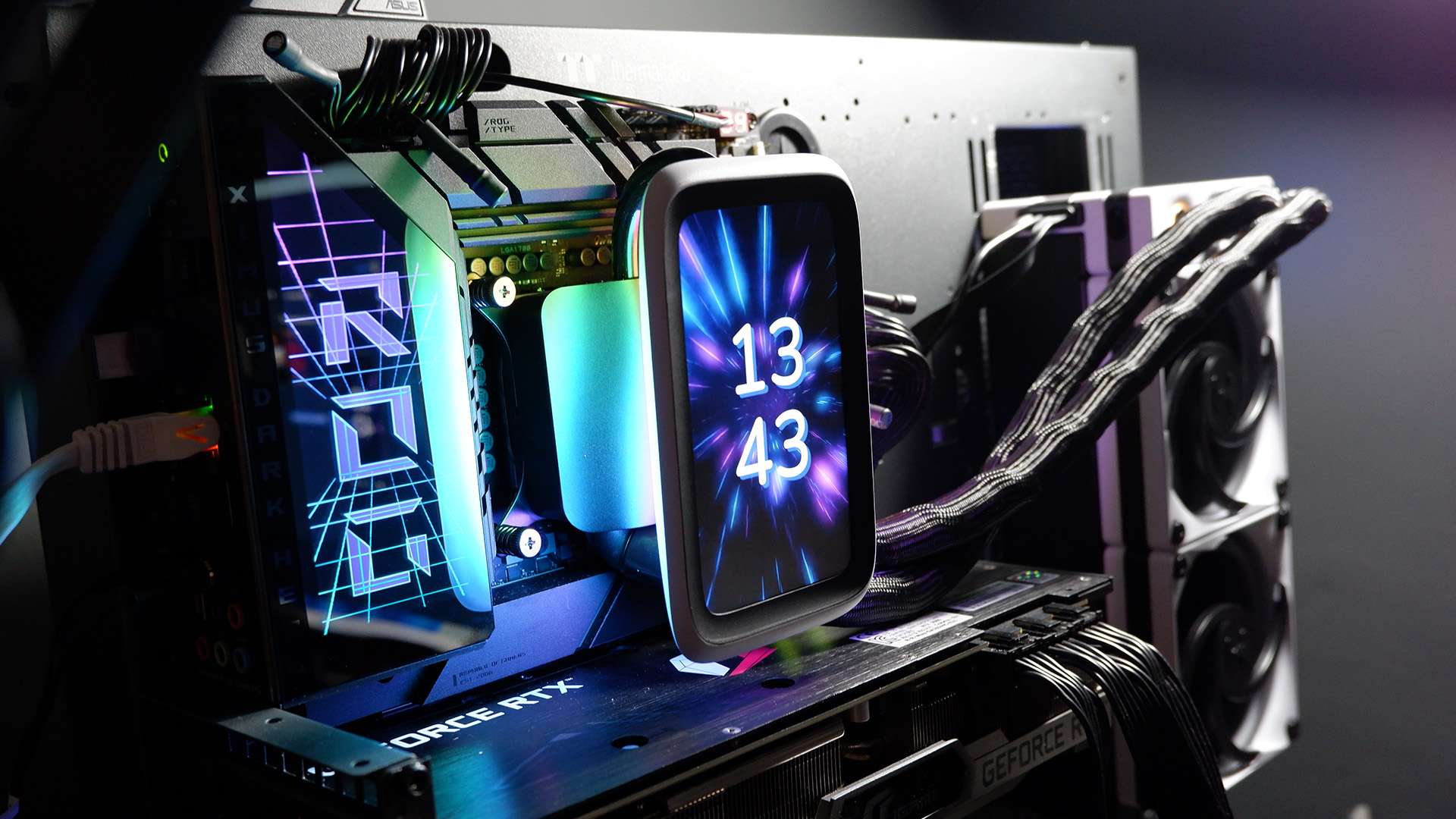
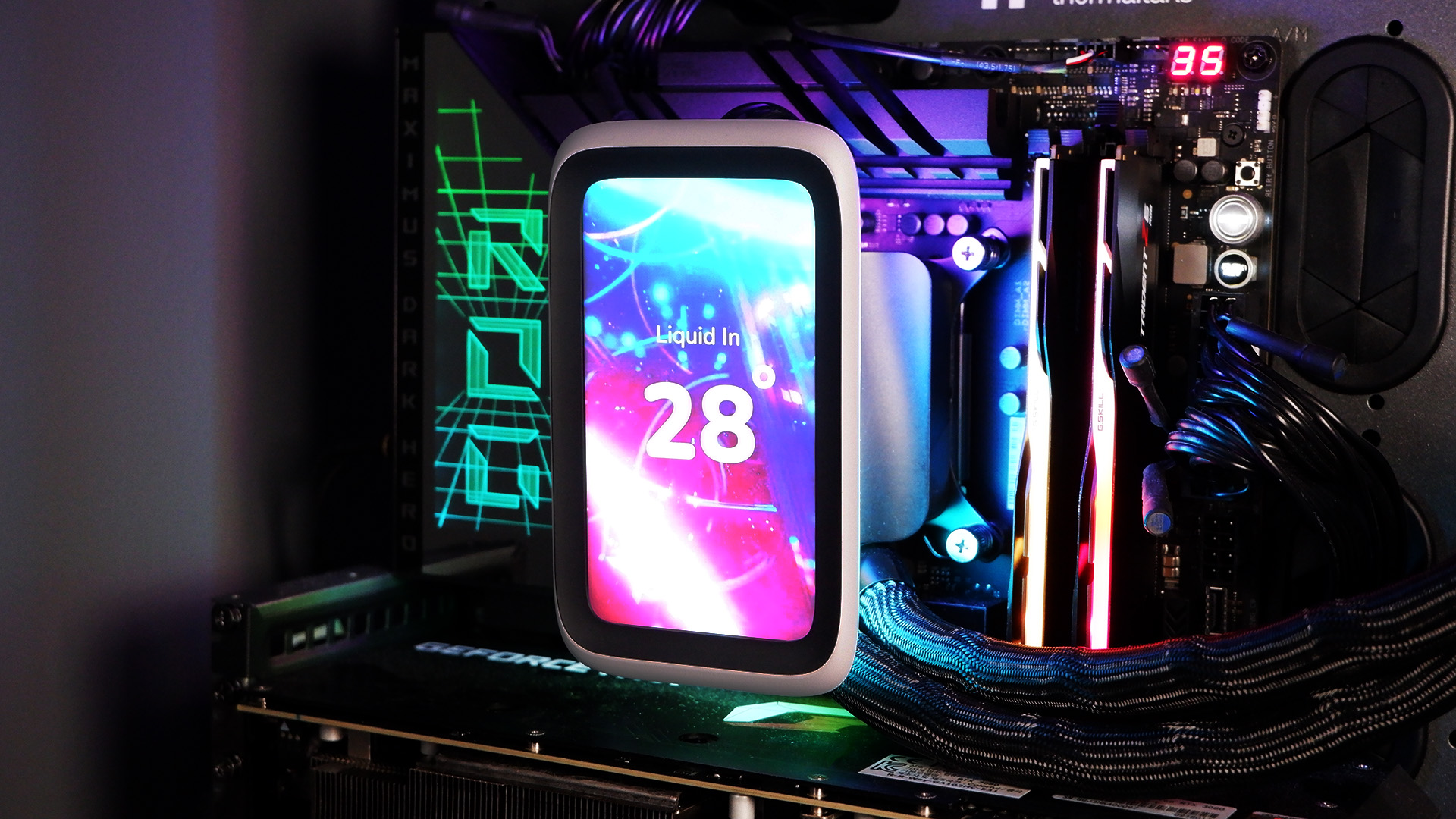
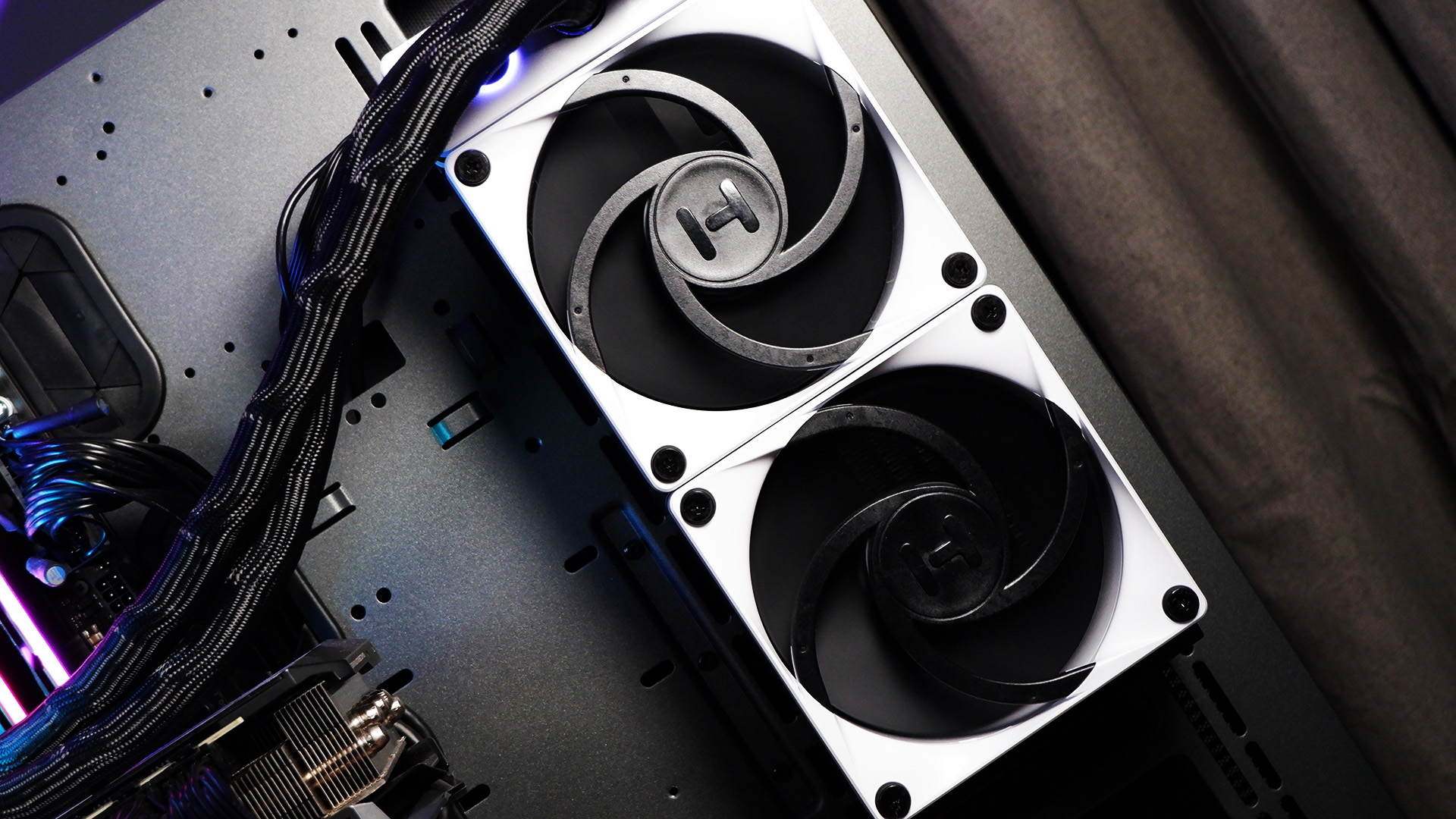
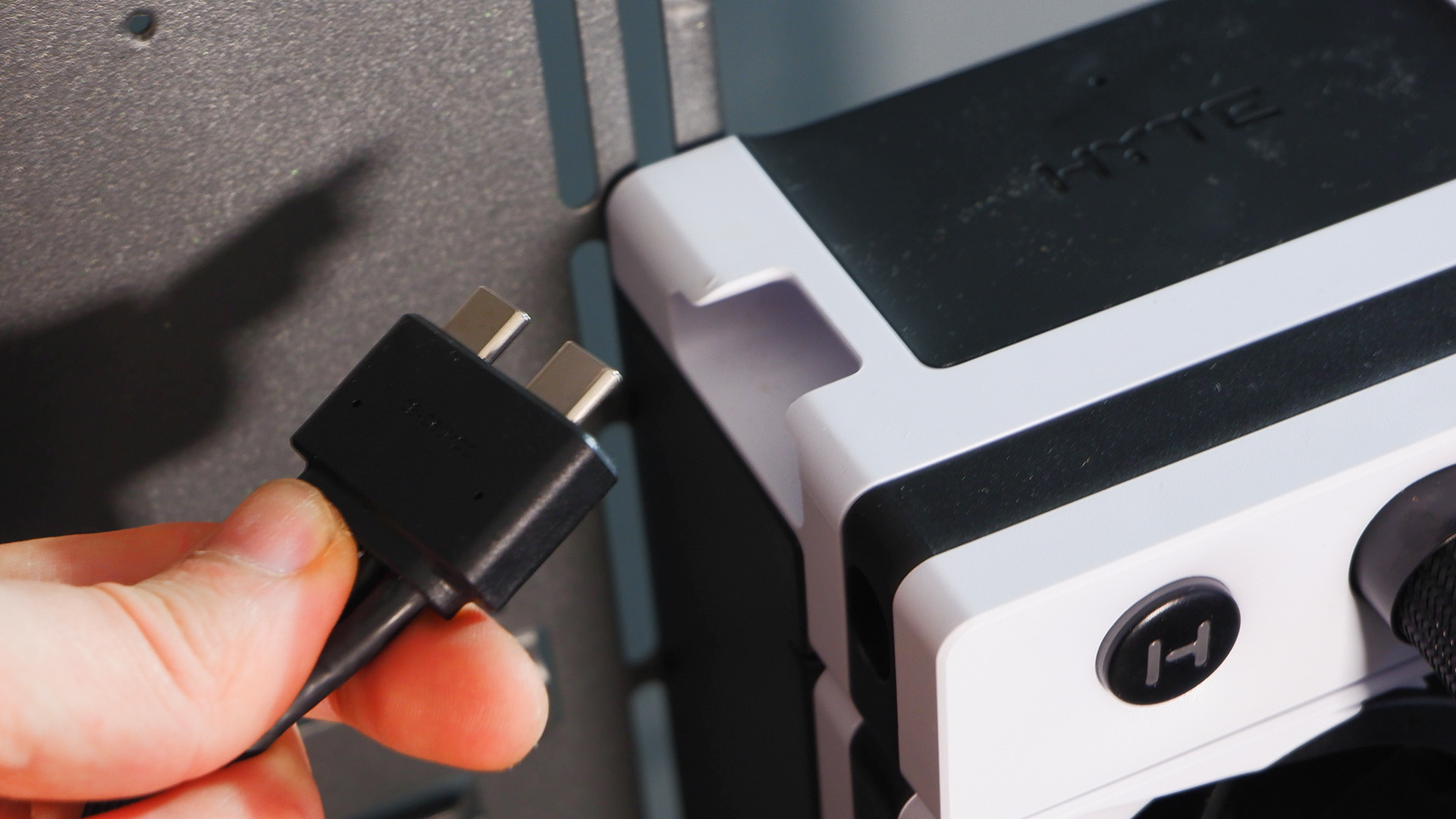
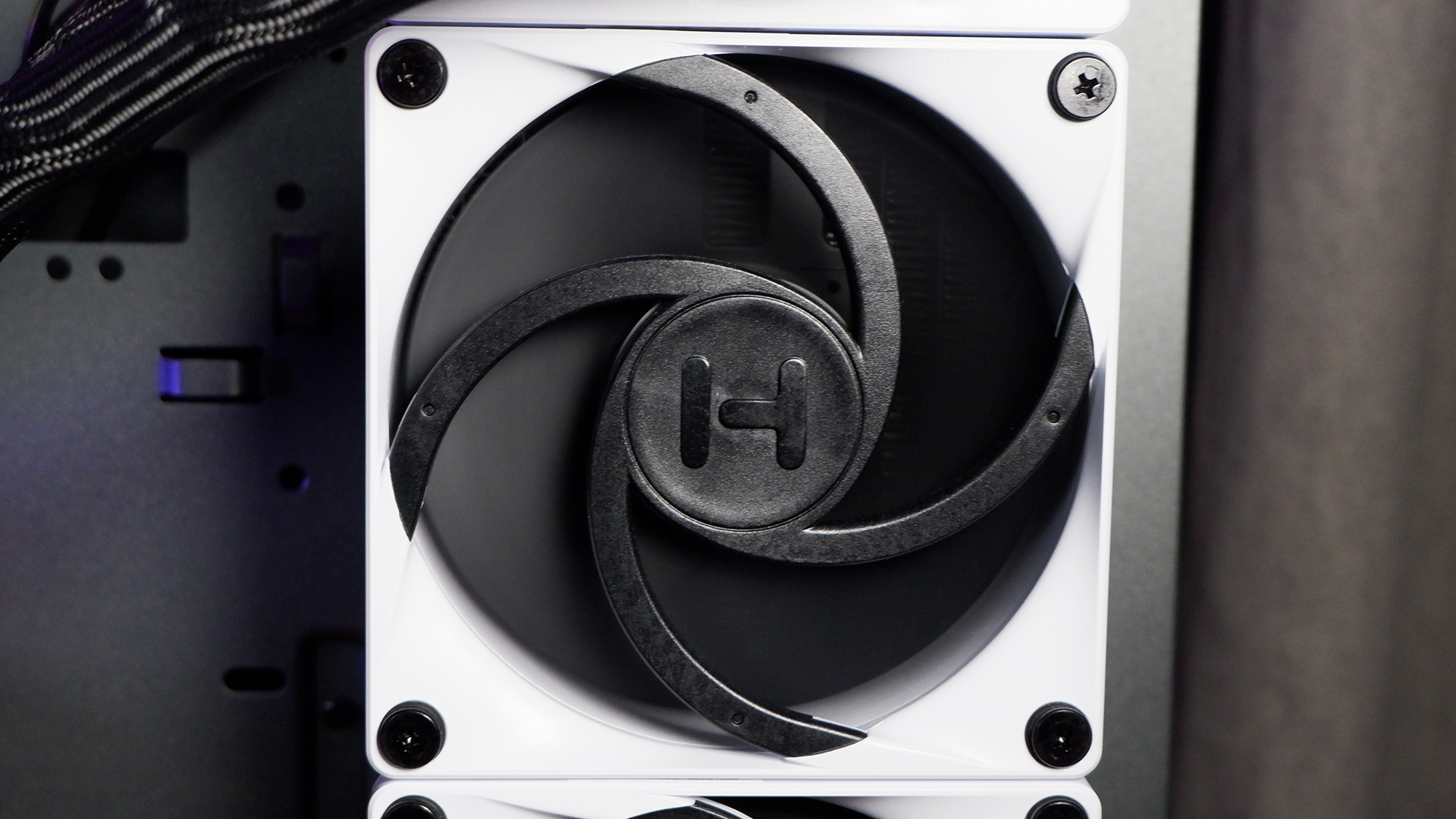
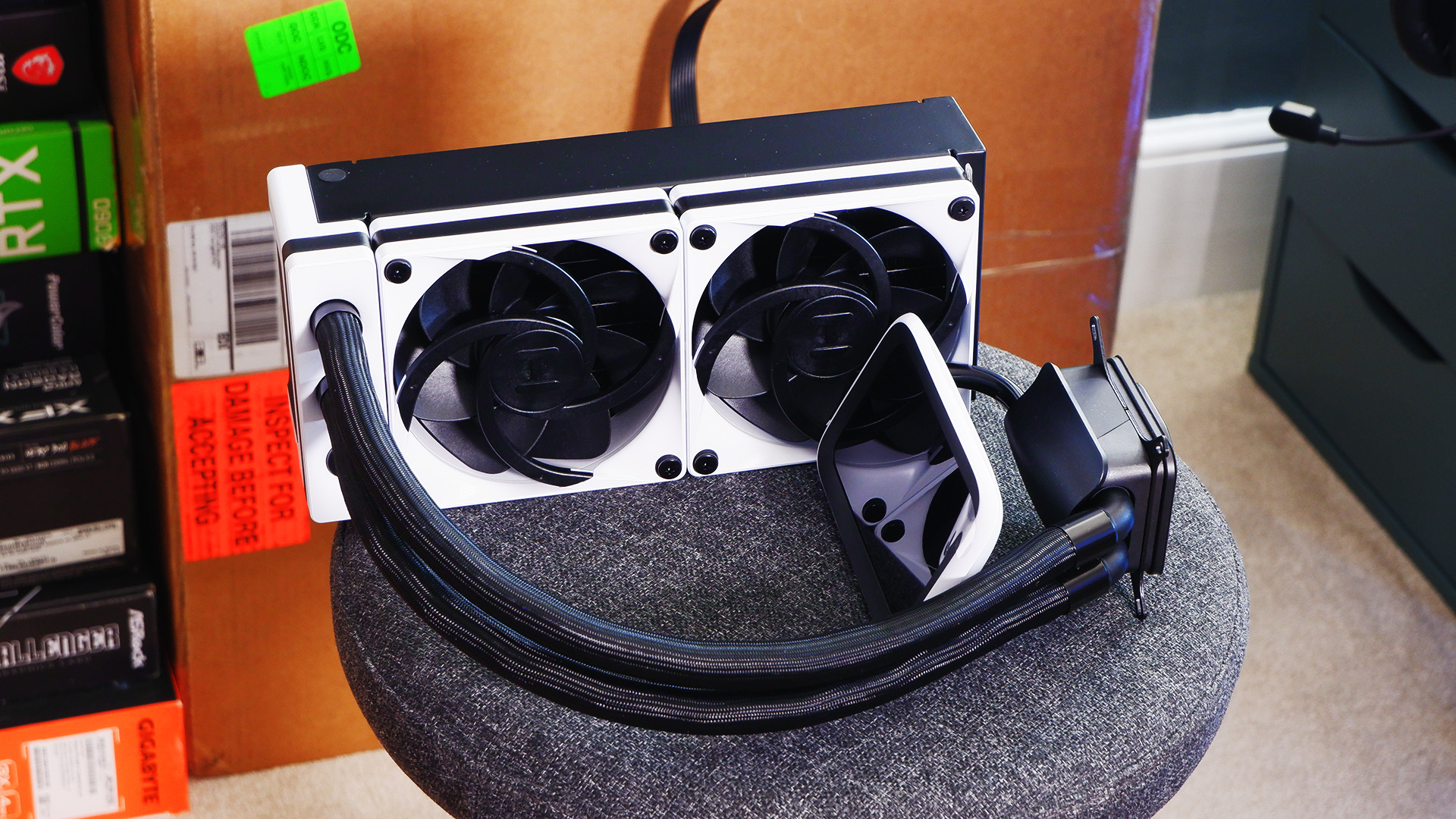
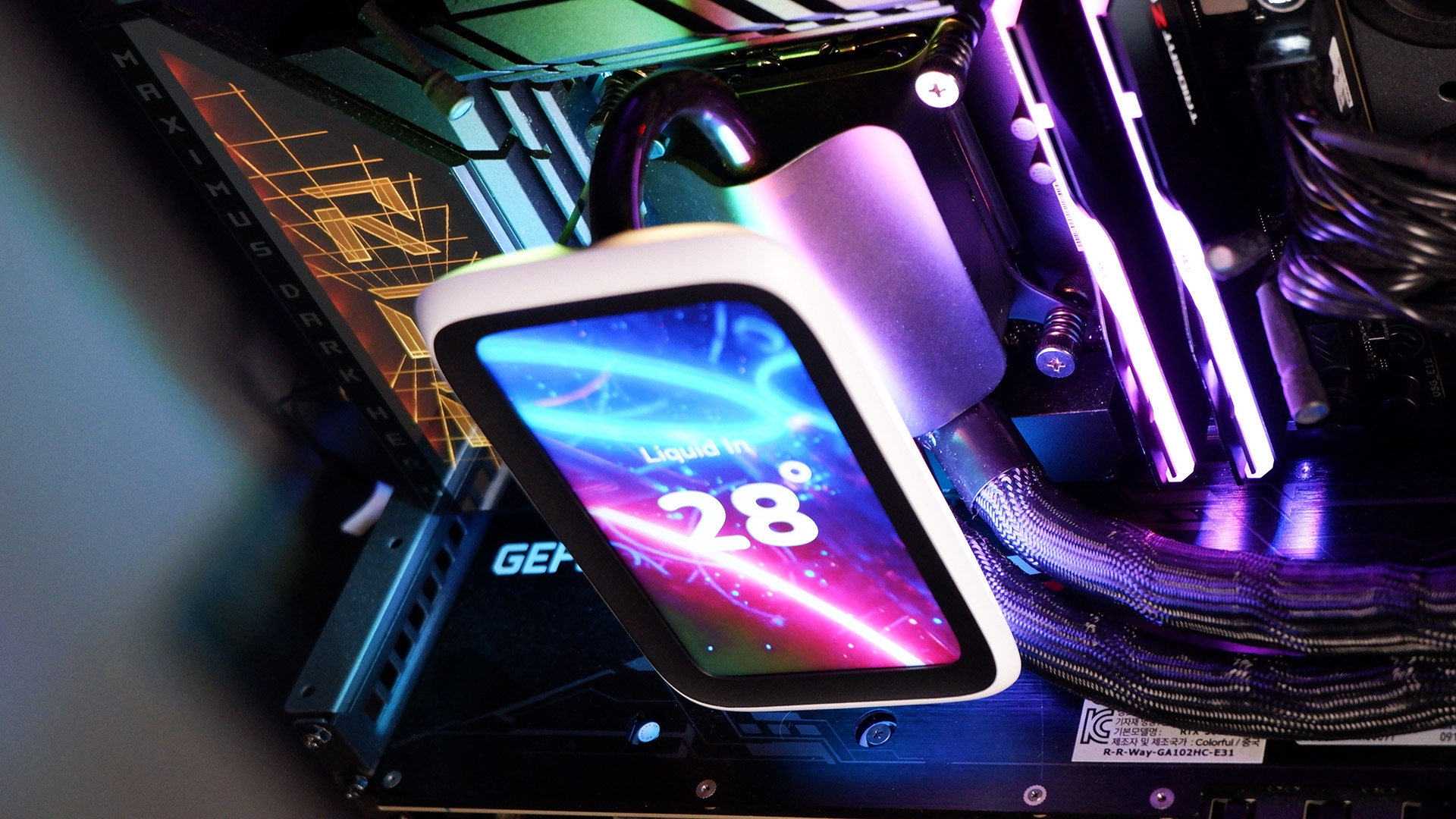
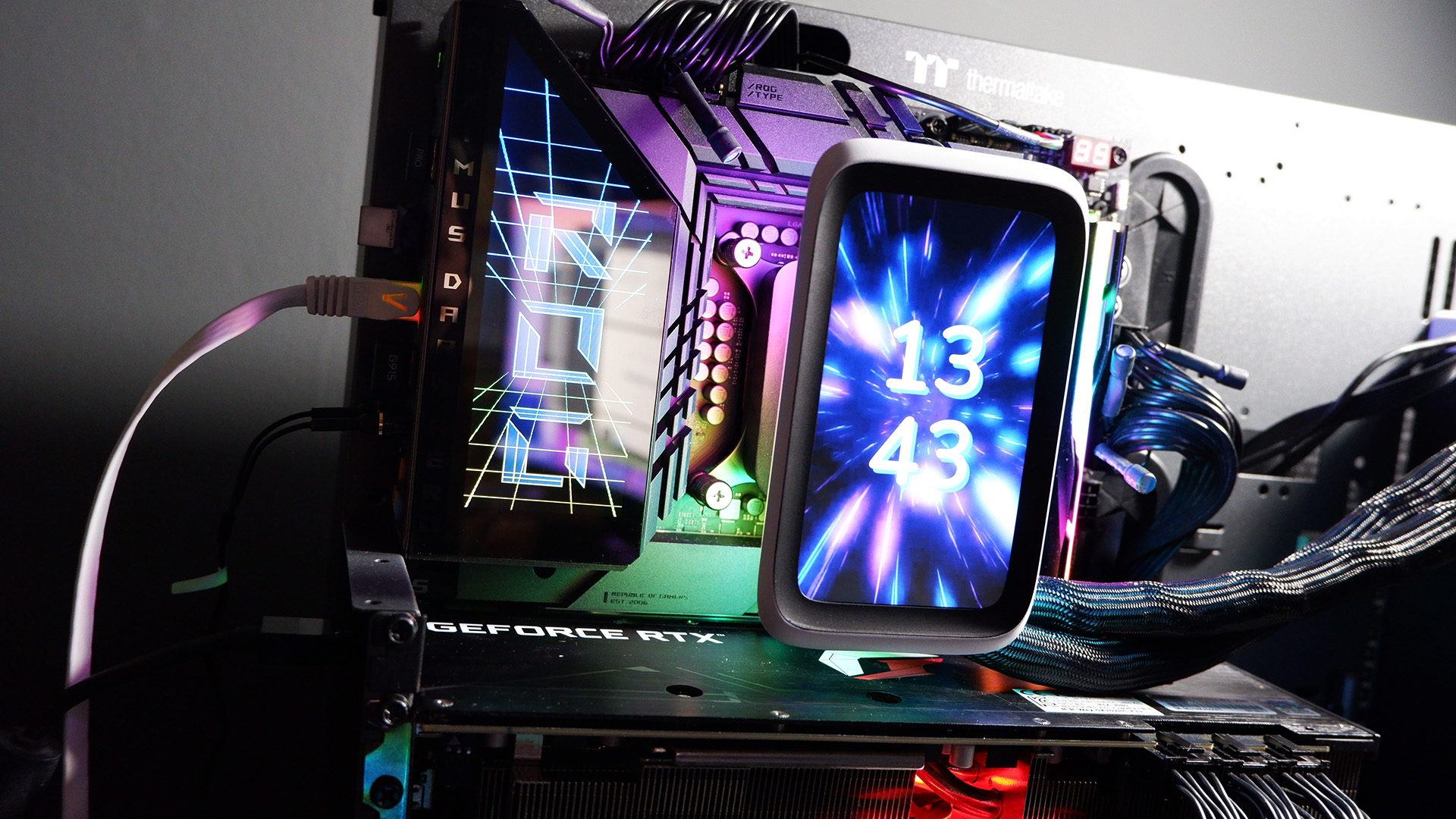
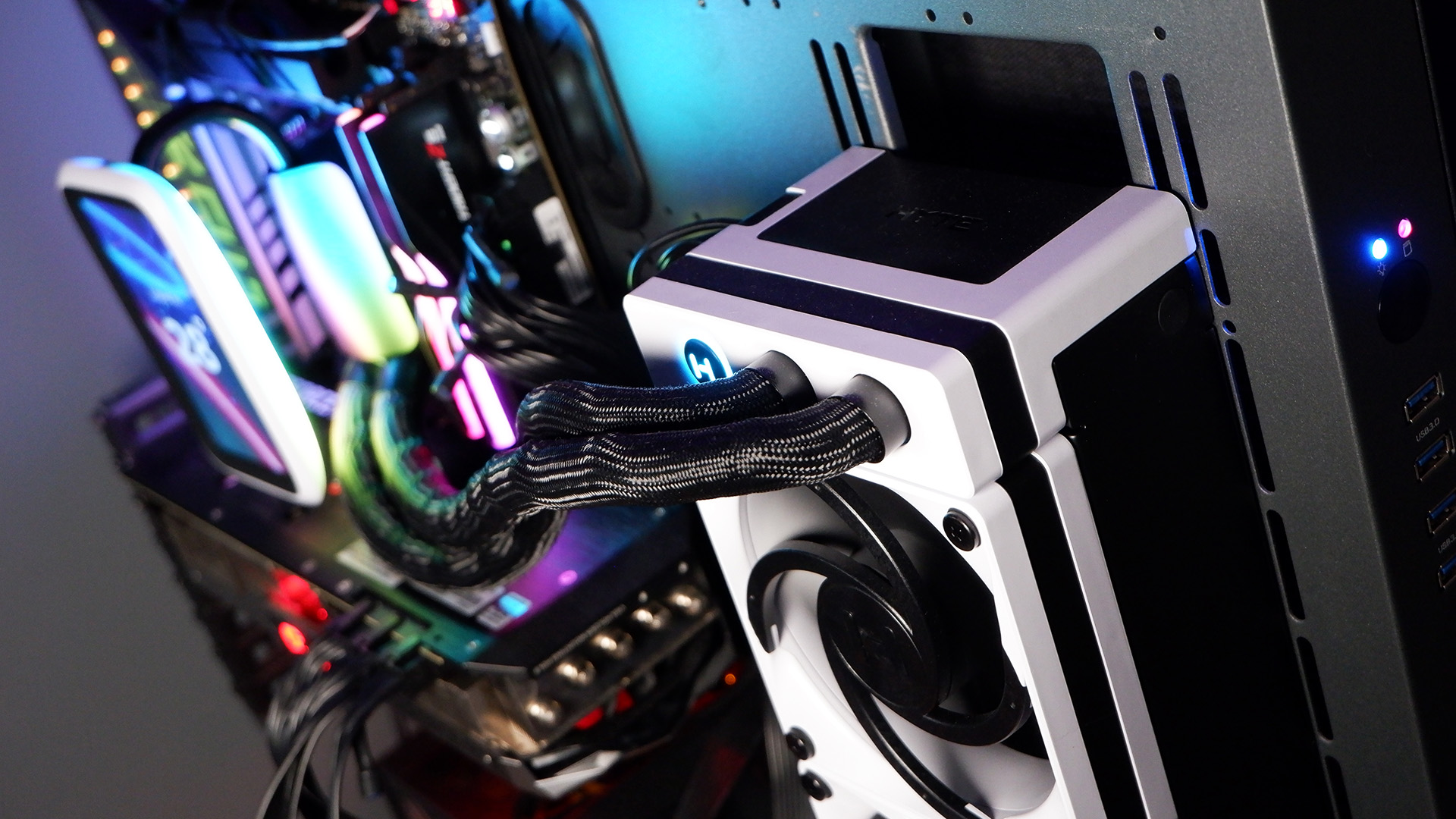
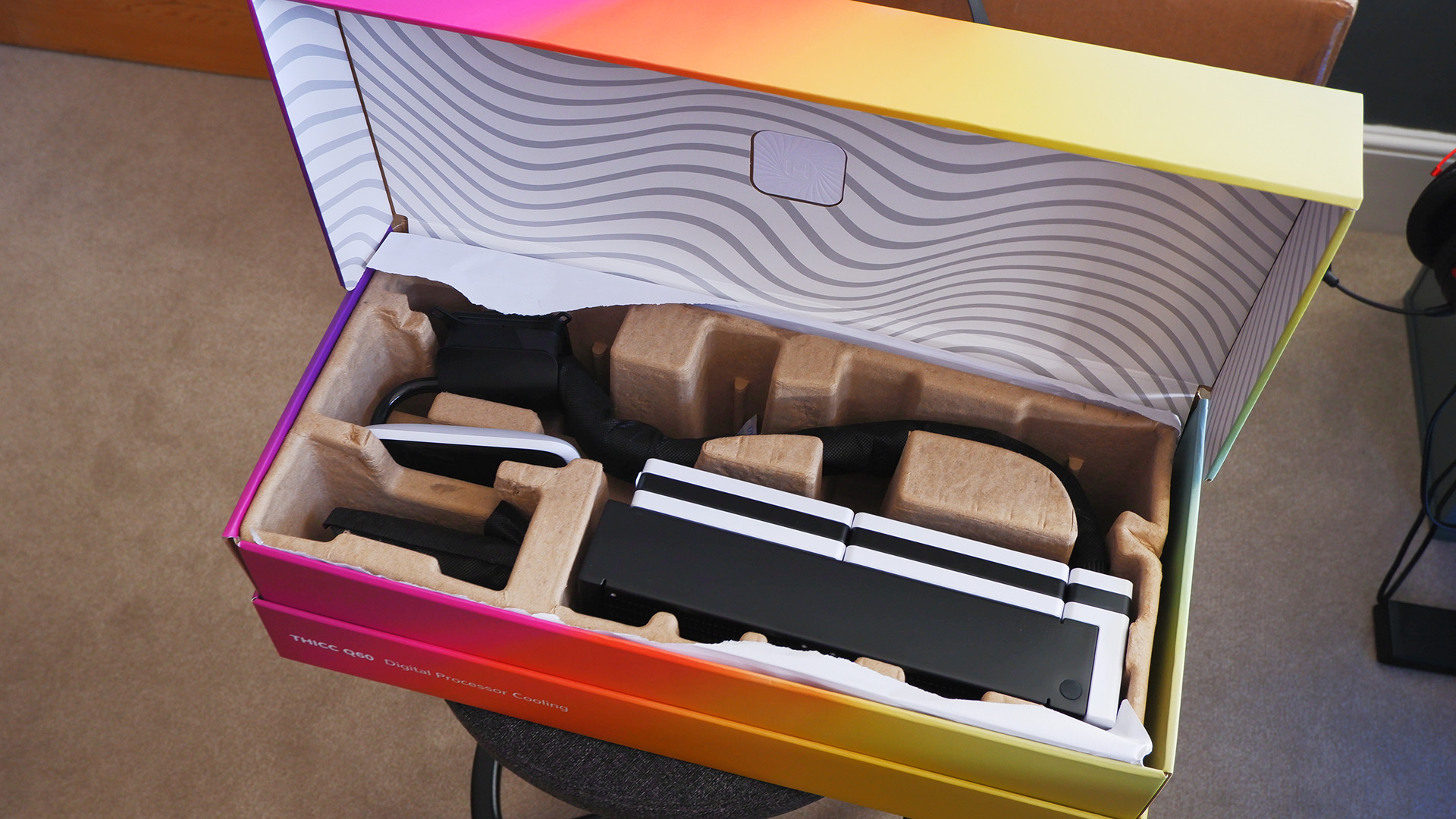
Specifications
Reasons to buy
Reasons to avoid
✅ You want the liquid cooler equivalent of hanging a billboard from Times Square in your living room: Yep, it's big, it's raucous, it's... maybe a little over-the-top?
✅ You want an all-in-one ecosystem with minimal cables: You can daisy chain heaps of fans and LED strips with just a single Type-C cable to the Thicc Q60.
❌ You don't want the liquid cooler equivalent of hanging a billboard from Times Square in your living room: It's not for everyone, this. But hey, at least we can all agree it makes an impact.
❌ You want the best performance for the best value: This is neither the best performing nor the best value liquid cooler around. Far from it.
I can already tell this pick will be divisive. The Hyte Thicc Q60 has earned our pick as the best looking liquid cooler, though it's admittedly a love-it or hate-it design. That's because it includes a—oh who am I kidding, you already know—massive screen.
A massive screen capable of running all manner of widgets sits atop of the coldplate on the Thicc Q60. It can show you album art, thermal information, the weather outside, or just trippy artwork.
Personally, I used this screen as a means to add some flair to a PC build I was working on for the website, as seen here, rather than a window into my PC's performance. But to each their own.
That screen is actually powered by its own tiny processor. Yes, it's a CPU cooler with its own CPU. An ARM-based one, mind.
If you can look past the screen on a swivel for a second, one of the more impressive features on this liquid cooler is actually how it connects up to other doodads and doohickies in your system, otherwise known as fans and LED strips.
The cooler itself uses a USB 2.0 header, a 6-pin PCIe power connector, and a PWM connector. These all terminate in a pair of Type-C connectors on a single cable, which plugs into the radiator. This means there are no cables to or from the screen or coldplate.
The radiator can also act as a hub for other Hyte cooling products, in lieu of the company's NP50 hub. There's a spare USB Type-C port to one side, which can be connected to a cable terminating in either a USB Type-C female port or a Nexus Link Type-M magnetic connection. The former can be connected to Hyte's USB Type-C RGB LED strips, while the latter hooks onto its FP12 fans. These can also be daisy-chained, ie the radiator connects to three fans in sequence, and these three fans then onward to three RGB light strips. Then more fans, or light strips. And so on and so forth, up to 18 total devices.
As for performance, I was expecting a little more out of Hyte's thick radiator and high-speed fan combo. It's decently capable of cooling a high-performance processor, but far cheaper coolers manage better. It also turns the fans off when it hits around 35°C, which is great for reducing noise levels but means it didn't fare as well as others in my test of how long it takes to return to idle temp. It is quiet on default fan curves, too—though crank those fans up to their maximum speed and, boy, you hear 'em.
No doubt a mixed bag—if you are the type of person to want something flashy and fancy, this is absolutely the flashiest, fanciest cooler around.
You'll have to pay for that privilege, however. It's double, or even triple, the price of some good liquid coolers.
Read our full Hyte Thicc Q60 review.
Also tested
Corsair iCUE LINK H150i RGB
AIO coolers can be fiddly to install because of all the fan cables, especially if they have RGB LEDs. Corsair's solution to this is its LINK system, where the fans just directly slot into each other. Unfortunately, the system isn't totally fool proof and it's very expensive.
Read our full Corsair iCUE LINK H150i RGB hands-on.
MSI MEG CoreLiquid S360
The MEG CoreLiquid S360 is a very capable 360 mm cooler and it supports a very wide range of CPU sockets. That IPS display in the pump unit is really nice and it's easy to adjust in MSI's software, but you pay a high price for this extra luxury. Literally.
Read our full MSI MEG CoreLiquid S360 review.
How we test liquid coolers
We put all of the liquid coolers we review through a benchmarking suite designed to inform us about the limitations of any given cooler. We take the maximum CPU temperature across various stress tests, which we run for extended periods. These include:
- 3DMark Steel Nomad—10-minute stress test
- x264
- Metro Exodus Enhanced Edition benchmark—5 run loop
- Cinebench R23—10-minute multi-threaded test
We also measure the time it takes for the processor to return to idle temperature following a run of the CPU-intensive benchmark, Cinebench R23. This offers a guage of the cooler's ability to move heat away from the processor and to the radiator or heatsink.
Where to find the best deals on AIO liquid coolers
Where are the best AIO cooler deals?
In the US:
Amazon - Regular savings on the best AIO coolers
Walmart - Usually some good savings on liquid coolers
Newegg - Big brands with big savings, AIOs for all budgets
Best Buy - Great place to look for a cheap liquid cooler
In the UK:
Overclockers - Plenty of AIO coolers to choose from
Scan - Over 150 liquid coolers to browse through
In Australia:
Mwave - Lots of big brand AIO coolers to find savings on
Computer Alliance - Liquid coolers to suit every budget
FAQ
Is an AIO better than an air cooler?
The first question people have is usually this: Air or water? Air cooling is generally cheaper and simpler. High end air coolers are better than ever but they're very bulky, and good quality AIOs generally outperform them. Water cooling is more efficient, as water is a better thermal conductor, which means it's better at transferring heat away from your CPU. There remains a tiny risk of leakage, but this is becoming exceedingly rare.
Noise levels are highly dependent on the fans used, but other than outliers, such as comparing a 120mm AIO to a twin tower/fan combo, a good quality AIO will be quieter than an air cooler when presented with a high heat load.
In terms of actual peak cooling performance there's not a lot in it between the best of each category, but AIOs are generally quicker at getting from peak to idle temperatures than a straight air cooler is.
A good air cooler should also last longer than a good AIO cooler, although the latter should also last a very long time. You might want to replace a good AIO after 6 or 7 years due to pump failure, for example, while a good air cooler shouldn't need replacing at all.
Is an AIO cooler worth it?
If you really want to go all out, you’re maybe better off with a fully custom water-cooling loop, but they are complicated, expensive, require maintenance, and have far more points of failure. AIOs are simple, they’re all but maintenance-free, they're cheaper, and they cool almost as well—the 360 mm and bigger ones do, at least.
Do you need to refill AIO coolers?
The reliability of AIO coolers has come a long way. AIO leaks are exceedingly rare. Like any other mechanical device, there’s always the low possibility of a pump failure, but luckily, modern CPUs have protection built in should it get too hot.
The bottom line is that you can run an AIO in your system with peace of mind.
Coolers can 'degrade' over time as coolant slowly evaporates or falls out of the solution. Still, these kinds of things are becoming less of a concern as manufacturers learn new tricks and methods after years of testing and feedback. A modern AIO should serve you well for many years.
Can you use an AIO on any CPU?
For the most part, yes, though there are some things to be aware of.
Most of the best AIO coolers support AMD and Intel's latest desktop CPUs—in other words, those that use the AM5 socket for the former and the LGA1851 socket for the latter. However, older chips may have limited support.
If you plan on sticking with AMD's AM5 platform, any cooler you get now will be good for a couple of years, at the very least. Whereas on Intel's processors you usually get two chip generations per socket.
Even if your processor doesn't support the latest socket, some manufacturers will offer kits you can order that include the required brackets. Just check their website to find out if that's possible.
The biggest gaming news, reviews and hardware deals
Keep up to date with the most important stories and the best deals, as picked by the PC Gamer team.

Nick, gaming, and computers all first met in 1981, with the love affair starting on a Sinclair ZX81 in kit form and a book on ZX Basic. He ended up becoming a physics and IT teacher, but by the late 1990s decided it was time to cut his teeth writing for a long defunct UK tech site. He went on to do the same at Madonion, helping to write the help files for 3DMark and PCMark. After a short stint working at Beyond3D.com, Nick joined Futuremark (MadOnion rebranded) full-time, as editor-in-chief for its gaming and hardware section, YouGamers. After the site shutdown, he became an engineering and computing lecturer for many years, but missed the writing bug. Cue four years at TechSpot.com and over 100 long articles on anything and everything. He freely admits to being far too obsessed with GPUs and open world grindy RPGs, but who isn't these days?
- Jacob RidleyManaging Editor, Hardware
- Antony LeatherContributor
- Chris SzewczykHardware Writer
